#i did not have time to research
Text
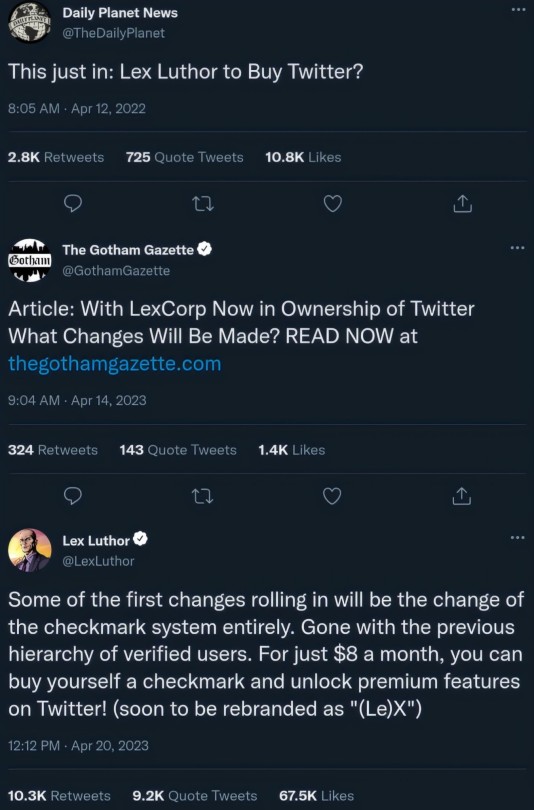
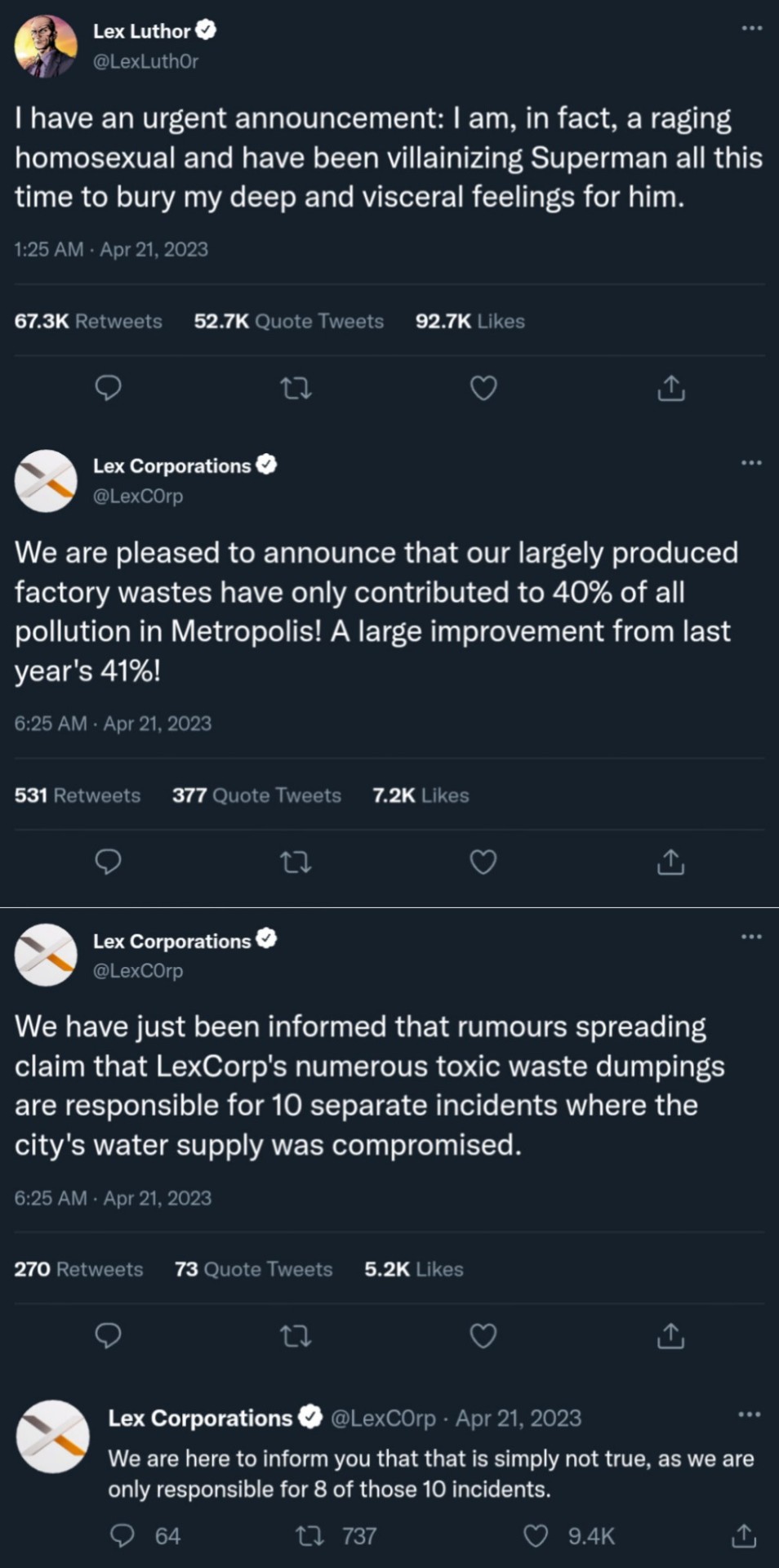
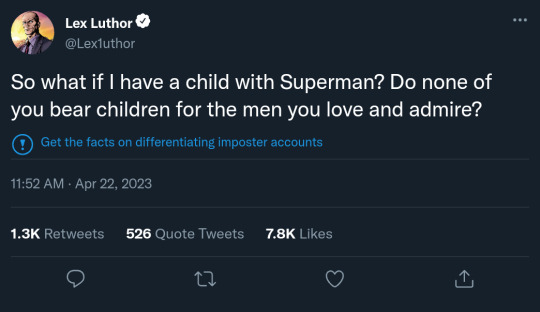
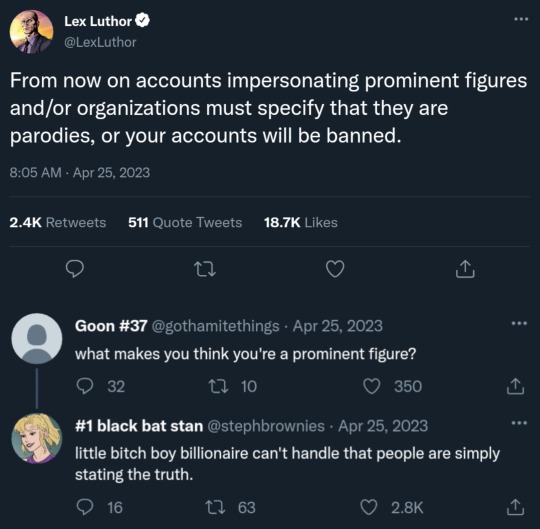
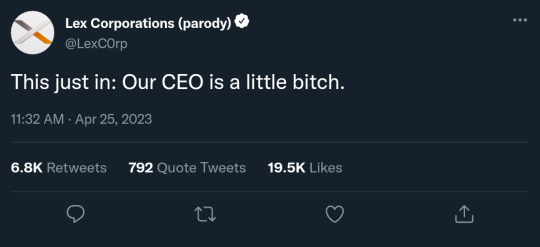
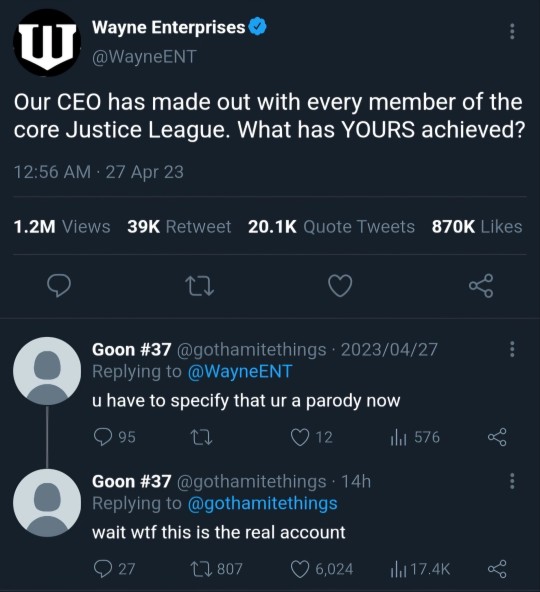
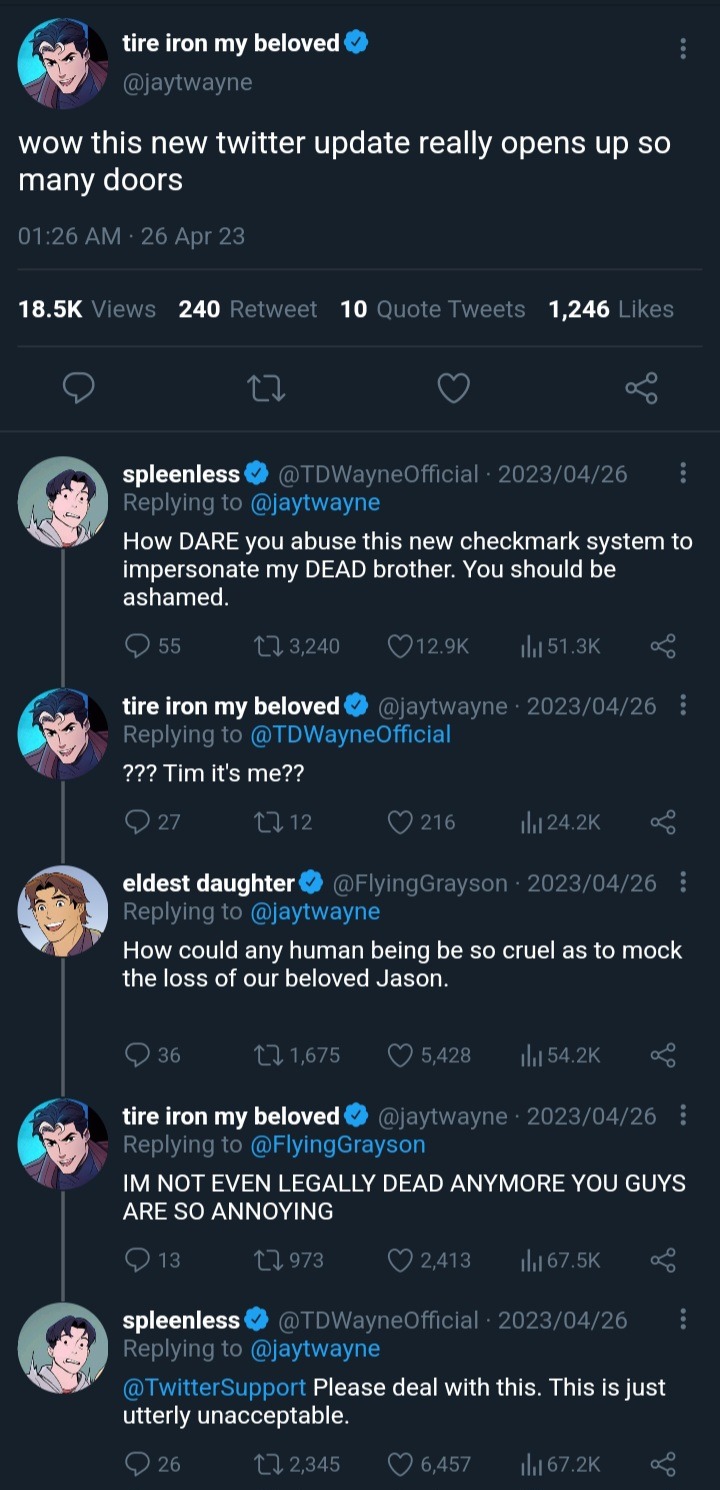
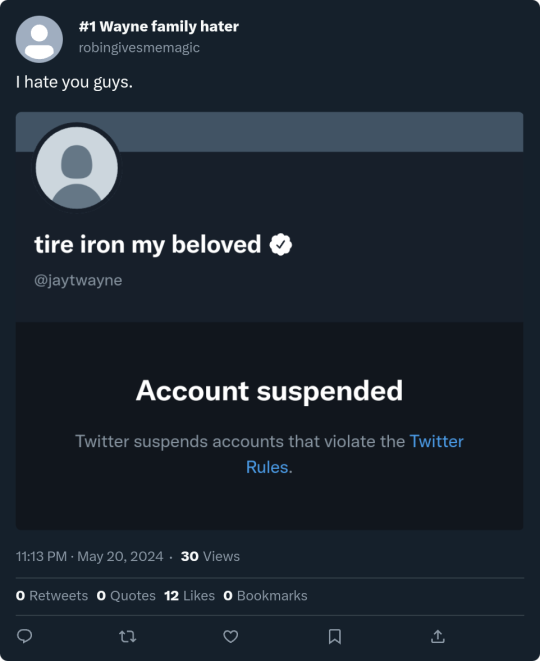
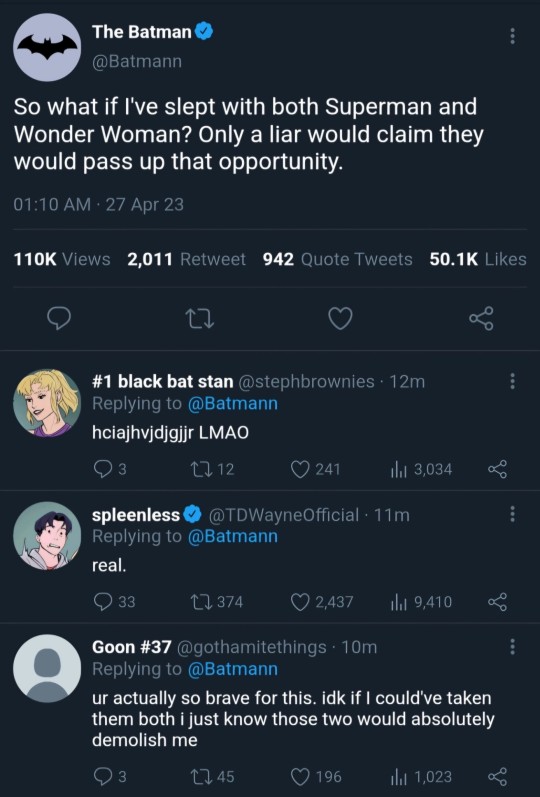
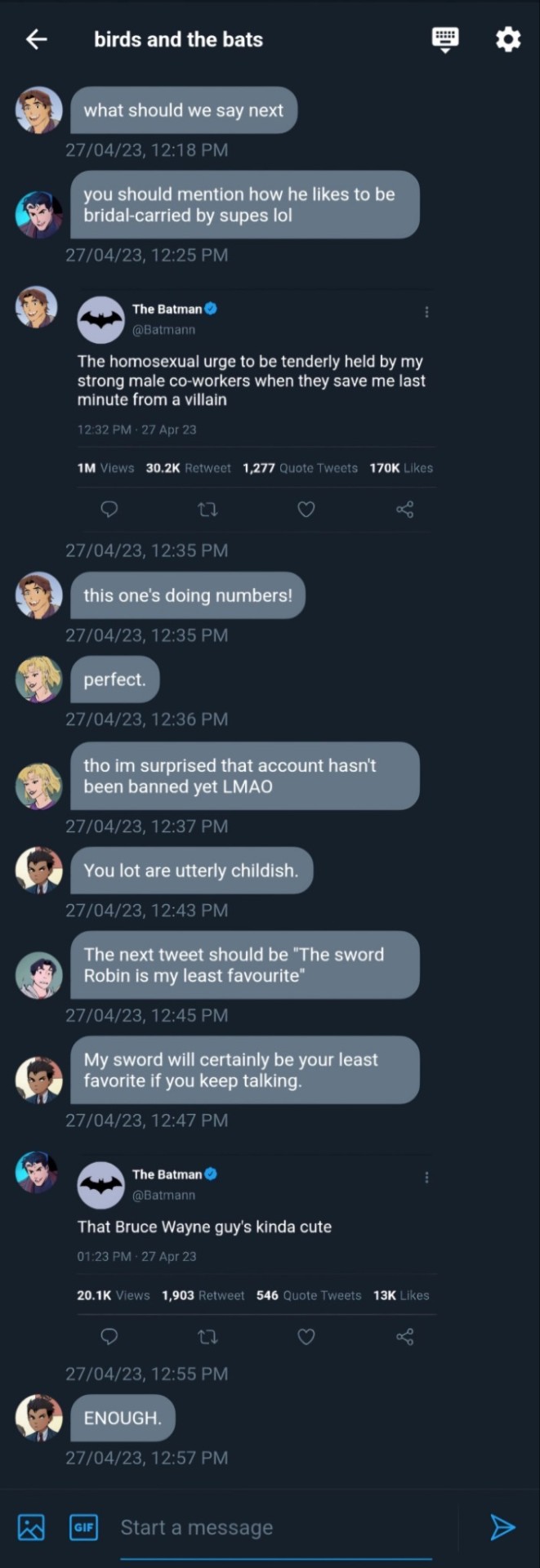
the muskification of twitter except it's lex luthor instead of elon lol
<- Prev Masterlist Next ->
#this is almost as bad as the time Lex luthor stole 40 cakes.#lex being the dc verse's elon is hilariously perfect#and gothamites are relentless so theyre probably having a field day with this#gothamites using every opportunity to dunk on metropolitans for having a shitty billionaire#the imposter accounts were run by kon and Lois lmao#the batkids are absolutely gonna impersonate each other so goodluck to bruce because the PR team's gonna be LIVID#social media au#the batkids later that day: Bruce you should totally buy tiktok#bruce: what? absolutely not im not spending money on a social media platform#batkids: but it'll make lex SO mad#bruce considering: hmm.#dick grayson#jason todd#bruce wayne#lex luthor#stephanie brown#batfamily#damian wayne#tim drake#batkids#batfam#batbros#batman#dc comics#incorrect quotes#crack#i spent an ungodly amount of time and effort on this please for the love of god dont make fun of me 😭#the script for this has literally been sitting in my drafts for over a year. i even did research on all the dates when this fiasco unfolded#texts#fanatical posting
5K notes
·
View notes
Text
"aphobia doesn't exist"
bitch literally not that long ago an aroace youtuber animator was insulted by almost half of its community for being it
#i did some research about it and found out that the problem was principally that she had previous experience in the romantic area#so people just didn't take her seriously and said she was lying#even though she stated multiple times that she wasn't comfortable in those situations#now things are more calmed but damn#mind your own bussiness#i believe she knows more about herself than you#sorry if i offended you with this comment but i hate how aro/ace/aroace people are always left behind#insulted and rejected because they “dont know what they are talking about”#or because they “just have to wait for the right person”#or because they are “psychopaths and they are missing something”#i love that animator and she helped me realise a lot about myself#and now that i know the context i think i will start making a list and killing aphobes one by one#aromantic#arospec#asexual#aroace#acespec
9K notes
·
View notes
Text
Please, if you can, take a moment to read and share this because I feel like I'm screaming underwater.
NPD (Narcissistic Personality Disorder) stigma is rampant right now, and seems to be getting progressively worse. Everyone is using it as a buzzword in the worst ways possible, spreading misinformation and hatred against a real disorder.
I could go on a long time about how this happened, why it's factually incorrect (and what the disorder actually IS), why it's harmful, and the changes I'd like to see. But to keep this concise, I'll simply link to a few posts under the cut for further reading.
The point of this post is a plea. Please help stop the spread of stigma. Even in mental health communities, even around others with personality disorders, in neurodivergent "safe" spaces, other communities I thought people would be supportive in (e.g. trans support groups, progressive spaces in general), it keeps coming up. So I'm willing to bet that a lot of people on this site need to see this.
Because it's so hard to exist in this world.
My disorder already makes me feel as if I'm worthless and unlovable, like there's something inherently wrong and damaged about me. And it's so much harder to fight that and heal when my daily life consists of:
Laughing and spending time with my friends, doing my utmost best to connect and stay present and focused on them, trying to let my guards down and be real and believe I'm lovable- when suddenly they throw out the word "narcissist" to describe horrible people or someone they hate, or the conversation turns to how evil "people with narcissistic personality disorder" are. (Seriously, you don't know which of your friends might have NPD and feels like shit when you say those things & now knows that you'd hate them if you knew.)
Trying to look up "mental health positivity for people with npd", "mental health positivity cluster bs", only to find a) none of that, and b) more of the same old vile shit that makes me feel terrible about myself.
Having a hard time (which is constant at this point) and trying to look up resources for myself, only to again, find the same stigma. And no resources.
Not having any clue how to help myself, because even the mental health field is spitting so much vitriol at people with DISORDERS (who they're supposed to be helping!) that there's no solid research or therapy programs for people like me.
Losing close friends when they find out, despite us having had a good relationship before, and them KNOWING me and knowing that I'm not like the trending image of pwNPD. Because now they only see me through the lens of stigma and misinformation.
Hearing the same stigma come up literally wherever I go. Clubs. Meetings. Any online space. At the bus stop. At the mall. At a restaurant. At work. Buzzword of the year that everyone loooves loudly throwing around with their friends or over the phone. Feels awesome for me, makes my day so much better/s
I could go on for a long time, but I'm scared no one will read/rb this if it gets too much longer.
So please. Stop using the word "narcissist" as a synonym for "abusive".
Stop bringing up people you hate who you believe to have NPD because of a stigmatizing article full of misinformation whenever someone with actual NPD opens their mouth. (Imagine if people did that with any other disorder! "Hey, I'm autistic." "Oh... my old roommate screamed at me whenever I made noise around him, and didn't understand my needs, which seems like sensory overload and difficulty with social cues. He was definitely autistic. But as long as you're self-aware and always restraining your innate desire to be an abusive asshole, you're okay I guess, maybe." ...See how offensive and ignorant that is?)
Stop preventing healthcare for people with a disorder just because it's trendy to use us as a scapegoat.
If you got this far, thank you for reading, and please share this if you can. Further reading is under the cut.
NPD Criteria, re-written by someone who actually has NPD
Stigma in the DSM
Common perception of the DSM criteria vs how someone may actually experience them (Keep in mind that this is the way I personally experience these symptoms, and that presentation can vary a lot between individuals)
"Idk, the stigma is right though, because I've known a lot of people with NPD who are jerks, so I'm going to continue to support the blockage of treatment for this condition."
(All of these were written by me, because I didn't want to link to other folks' posts without permission, but if you want to add your own links in reblogs or replies please feel free <3)
#actuallynpd#signal boost#actuallyautistic#mental health awareness#narcissistic personality disorder#people also need to realize that mental health professionals aren't immune from bias#(it really shouldn't come as a shock that the mental health field has a longstanding pattern of misunderstanding and mistreating ppl who ar#mentally ill or otherwise ND)#the first therapist i brought up NPD to like. literally pulled out the DSM bc she could barely remember the criteria. then said that there'#no way I have it because I have low self-esteem lmaoooooo#anyway throwback to being at work and chatting with a co-worker. and the conversation turning to mental health. and him saying that#he tries to stay informed and be aware and supportive of mental health conditions & that he doesn't want to be ignorant or spread harmful#misinformation. and then i mentioned that i do a lot of research into mental health stuff and i listed a bunch of things. which included#several personality disorders. one of which was NPD.#and after listening to my whole ass list he zeroed in on the NPD and immediately started talking about how narcissists are abusive and#he knew someone who had NPD and how the person who had it had an addiction and died from the addiction in a horrible way and he#was glad he did#fun times#or when i decided to be vulnerable and talk abt my self-criticism/self-hatred bc i knew my friends also struggled w that and i wanted to#support them by sharing my own coping methods. and they both(separately!) started picking and prodding at my npd through the lens of stigma#bc i'd recently opened up to them abt having it. they recognized self-hatred as a symptom and still jumped on me for it. despite me#trying to share hurt vulnerable parts of myself to help them and connect with them.#again..... fun times
7K notes
·
View notes
Text
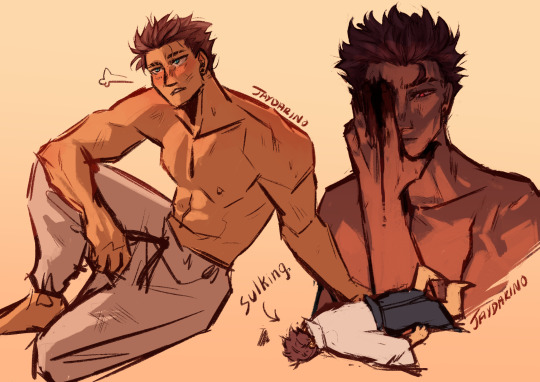

Human sukuna sketches
Close ups:

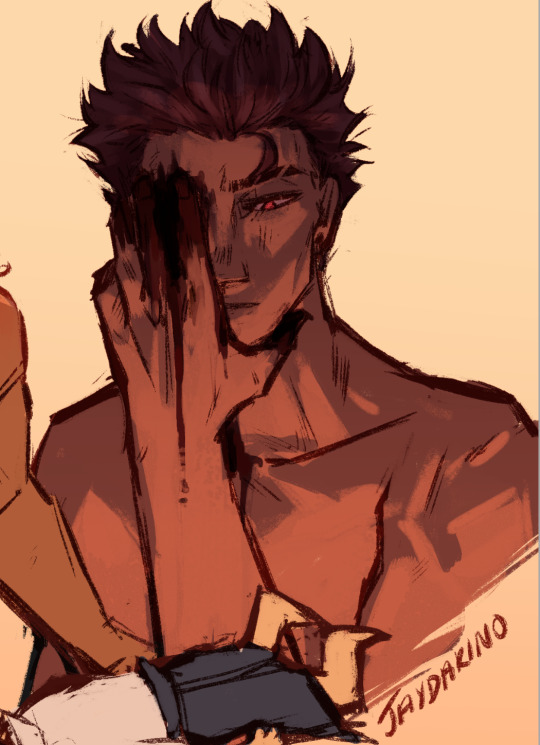

#my head is rotted over his backstory#gege please. its a base need..#i did so much research about heian fashion#only to draw him shirtless 90% of the time#who needs historical accuracy when you have hot man#ryomen sukuna#jjk#jujutsu kaisen#jjk fanart#true form sukuna#heian era sukuna#i neglected to do college work for this
2K notes
·
View notes
Text

gotta think like a wizard to catch a wizard babey
#to quote veth brenatto: only damage to the creature. that's how I see it going down.#this is a joke but I did think of it and laugh#I write SO much wizard research time I get v excited when I get to have wizard research time without having to write it#cr spoilers#essek thelyss#critical role
451 notes
·
View notes
Text


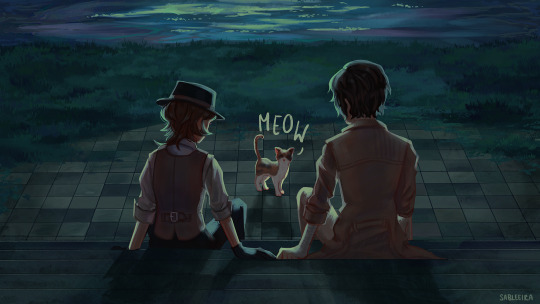
You know how “the moon is beautiful tonight, isn’t it?” is used as an expression for love confessions? It’s said that Natsume Soseki came up with it after overhearing a student translate “I love you” to Japanese in a very literal sense. While there is no source confirming that this exchange actually happened, I still think a scene referencing the expression with Natsume randomly appearing would be hilarious
#I have been sitting on this scenario for MONTHS#I actually found out about it because I watched a cdrama with my gf that has a moon love confession type scene and I didn’t know it was#a thing in other Asian media as well so I had to research the origin.#did you spot the tiny other character cameo in one of these pictures 👀 you have to zoom in really far#soukoku#bungou stray dogs#bsd#bsd fanart#skk#chuuya nakahara#bsd chuuya#osamu dazai#bsd dazai#natsume soseki#bsd natsume#also why do I keep drawing faces in hard angles… Chuuya looked so wonky for a time and it’s still not great but I can live with it#my art
3K notes
·
View notes
Text
we don't talk about it enough but duck and billy's relationship in amnesty is truly a tragic one.
imagine: you rescue a mindless drone. you save his life, you give him autonomy, you give him language. you teach him trust. you protect him at your own expense. you name him billy. he knows three words in your language, and one is your name. you promise to keep him safe, and he betrays his programming to help you in return. he defies everything he was designed to do in order to aid you.
you save him from being a drone, but in doing so, you kill him. he was never supposed to be here this long. you gave him freedom at the cost of rapid decay, and now he's dying. and if he could just go back to his home planet, he would live, but he doesn't want to. because you're here. duck newton, his first friend, his savior, his guardian. you showed him that there is a better way to live - with free will, with pizza and playstations.
he's damned if he stays and damned if he goes. but you can't watch him suffer. that's not who you are. you're duck newton, local beefcake, defender of the disadvantaged. so you wait until he's engrossed in his video game - in humanity, in freedom of choice - and you strike him down out of mercy.
billy reverts to his original form: a four-armed being of light, once a drone, now a friend. he's beginning to disintegrate, but he has unfinished business here. he never finished his video game. and you give him one last gift of mercy: you lie to him. don't worry, you tell him - that character you're worried about? she's fine in the end. no, i know it seems bleak now, but she turns out okay.
you can't give him anything else, so you give him hope. it's the same thing he gave to you, all those months ago when you saved him.
#the adventure zone#the adventure zone amnesty#taz#taz amnesty#duck newton#this user is normal about duck newton. NORMAL ABOUT DUCK NEWTON#this time around i did not cry at ned's death but yknow what i DID cry at? BILLY DEATH SCENE!#also i had to research ff7/aerith in order to accurately write this post and guys the plot of amnesty seems to have some things in common#and aerith in particular or at least the way she dies seems to be very similar to billy's sitch#then again i dont play video games and idfk anything#so dont come for me#stuff#i know billy comes back and saves the day but EVEN STILL#this post is not supposed to be a shippy thing is anyone even out there shipping duck/billy i doubt it#that'd be WILD. but anyway. no this is just about the intense loyalty from an alien goatman and his savior duck newton
416 notes
·
View notes
Text
it was really only a matter of time until edwardian payneland happened and what if i channeled maurice about it. just a little
-
Charles is the son of the groundskeeper at St. Hilarion's School for Boys while Edwin is a pupil there. And he can't help but notice Edwin—how he’s nearly always alone, or else being harangued by the cruel older boys who call themselves his peers.
Charles privately thinks they hardly seem equal to him in poise or grace or manner. They are boisterous, brash, crass, violent, all overlaid with a veneer of false propriety, but Charles can see the cracks in it. He knows that sort by how they are inside, and they cannot be like Edwin at all. No, Edwin Paine's got a sad, drawn sort of look about him that Charles can't help recognizing. This lonely boy who feels somehow kindred in a way he can't put a finger on, but is pulled to him all the same, though by rights he'd do better to keep his distance.
Edwin often sits by the lake by himself, to read, or to do his assignments in the shade of the trees. Picturesque as a painting, he is. One day Charles dares to approach him, though he knows the risk in it—prepared to be rebuffed, rebuked for his untoward attention to someone he is meant to ignore; but the boy does not turn him away.
And so they become friends. Tentative, and then less and less so.
Together they explore the school's sprawling grounds, all of whose surprising hiding-places Charles Rowland knows by heart, having wandered them himself for years and made them his own refuge. The woods become theirs; the shore by the lake theirs; the shade of the trees theirs. The attic, where no one comes to look for them in the dead of night, also theirs.
And then one day Charles notices a group of boys surrounding Edwin. The usual cadre, and they're posturing, their voices loud in the autumn air. They’ve ripped Edwin's penny magazine from his grip and are tearing pages out of it, scattering them to be plucked up by the wind. Charles can do nothing else but step in. He shouts at them to back off, puts himself between them and Edwin, and gets himself thrashed for his trouble—but they, at least, finally leave Edwin alone.
Edwin, for his part, cannot believe Charles would be so reckless for his sake. Charles has not yet mentioned to him that he is used to this sort of treatment, and sees worse at home. They sit together in the boathouse by the lake, cross-legged, close enough for Edwin to dab carefully at Charles’ split lip and bleeding knuckles.
“You should not have done that for me,” he chides, though it carries no heat. “What will happen now?” He thinks word is sure to get back to the school, and there will be a scandal. Those boys, who so vocally despise Edwin, will hardly be quiet in their outrage, their humiliation. Charles’ father might be relieved of his post, and then Charles’ family will have to leave St. Hilarion’s. That is how these things go.
And what was it all for? For Edwin? How could it have been worth it?
“Doesn’t matter, does it?" Charles is saying, when Edwin surfaces from his troubled thoughts. "Couldn’t let them treat you like that. They had you five to one. And that, just ‘cause you’re different. I know how it is.” Charles’ eyelashes are very long, and the light turns his eyes a warm, deep amber as he talks fiercely, insistently, in defense of Edwin.
It’s terribly forward, Edwin thinks. And, despite every misgiving, he welcomes it. No one has ever fought for Edwin before. No one has ever spoken about him with such conviction.
Then Charles seems to lapse into pensiveness. “You didn’t have to…” he says softly. "All this." He gestures, with the free hand Edwin isn’t busy wrapping up, at the little bottle of antiseptic, the scissors, the roll of bandages and the cloths, all spread out on the floorboards between them.
“Of course I did,” Edwin says.
Really, he had not given it much consideration. He had had only the presence of mind to memorize the sight of Charles kneeling in the dew-damp grass, angry gaze still spitting fire at the backs of Edwin’s retreating bullies. He’d had blood in his bared teeth, and the briefest flash of desire had seared through Edwin—to kiss him. Merely in thanks, perhaps, but still, to kiss him.
He would know the warmth of Charles’ mouth. Fleeting, forbidden, it would sear itself into his mind for ever.
Of course, he had done no such thing; for he could not. Instead, he’d done the only thing he could do—bent low towards Charles, and squeezed his shoulder once, as if to say, Wait here for me. I will come back to you.
And as he'd turned on his heel and gone off in the direction of the infirmary, leaving Charles there with dusk encroaching, Edwin had hoped Charles understood his gesture for the indelible promise it was.
#dbda#dead boy detectives#dead boy detective agency#payneland#oops new 'verse just dropped i guess#i did ZERO rabbithole research for this particular bit but i fear it has consumed my brain and i may have to write more#the weirdest thing is i wrote it while listening to portugal. the man and you know what. it fucking works. it works. just trust me on this#'stop right now take a minute take your time said i'm living all alone inside a dream'#yes they are in the boathouse. yes they are in fact. what of it. yes there will be telegrams. and trysts.#that's me frothing at the mouth. give edwin his edwardian love story!!!
328 notes
·
View notes
Text
If you ask the chain for their worst/ most annoying enemy
Time: redheads- I mean Redeads
Twilight: *stifling a laugh* Shadow beasts
Four: *deadpan* Gibdos
Legend: *can't think of anything challenging* I'm gonna say, umm... *shoots a teasing glance at Sky* Sleep
Wild: definitely Guardians
Sky: Demon lords with long tongues
Hyrule: *looks at Sky* not even gonna ask about that one, but Octorocks. They're everywhere in my world
Wind: I was gonna say Octorock too! But specifically Big Octo, those are the worst
Warriors: ...
Warriors: SO WHAT AM I THE ONLY ONE WHOS GONNA SAY GANON
#wasn't meaning to put redheads instead of redeads for time but autocorrect did that and I decided to roll with it#I don't have all the games. I did research for four#but a lots of this is mainly what enemies I hate the most tbh#shadow beasts are terrible and I want to rid Hyrule's world of octorocks more than I want to be rid of ganon#linkeduniverse#linked universe#lu#Lu chain#Lu memes#but actually? I honestly don't see legend as really struggling with any enemies- even ganon#bros got skill#which is why I said sleep because double meaning- but I also couldn't think of anything else :|
586 notes
·
View notes
Text
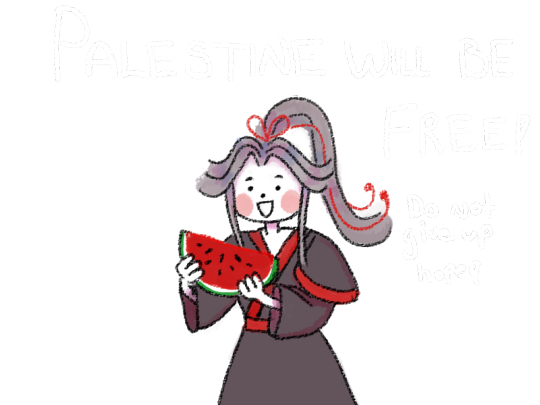
Wei Wuxian eats a watermelon. Yep!
#poorly drawn mdzs#mdzs#wei wuxian#nothing out of the ordinary here. Just good fandom fun#Watermelon discourse has been going on and I want to let people know where I stand.#This came about because I wanted to experiment with translating the (traditional) PD-MDZS style to a digital format#and while sitting there thinking of what to draw...my inspiration came to me.#This is the equivalent of sneaking vegetables into the spaghetti sauce but its important to get your gotdamn veggies#I'm not very good at organizing my thoughts (evidence: the tags of every post on this blog).#but please do not look away from this moment in history. One person cannot solve it and no one expects you to.#Even if it is just spending time doing some research on the situation and history. Or boosting posts that are more articulate#Any action helps! ANY action! Everyone has a different level of capacity for this and that's okay. Anything is fine. Dont let it be nothing#Anyhow. did I like doing this digitally? Yes but its mixed. It was faster but also spark the same joy I usually get while drawing#I will have to get over it very quickly though. You will all see why in a few days
928 notes
·
View notes
Text
Double Indemnity, Veritas Ratio and Aventurine

This was originally a part of my compilation post as a short analysis on the Double Indemnity references, linking to this great thread by Manya on Twitter. However, I've recently watched the movie and found that the parallels run much deeper than just the mission name and the light cone itself, plus as the short synopsis I've read online. Since there isn't really an in-depth attempt at an analysis on the film in relation to the way Aventurine and Ratio present themselves throughout Penacony, I thought I'd take a stab at doing just that. I will also be bringing up things from Manya's thread as well as another thread that has some extra points.
Disclaimer that I... don't do analyses very often. Or write, in general — I'm someone who likes to illustrate their thoughts (in the artistic sense) more than write. There's just something about these two that makes me want to rip into them so badly, so here we are. If there's anything you'd like to add or correct me on, feel free to let me know in the replies or reblogs, or asks. This ended up being a rather extensive deep dive into the movie and its influences on the pairing, so please keep that in mind when pressing Read More.
There are two distinct layers on display in Ratio and Aventurine's relationship throughout Penacony, which are references to the two most important relationships in the movie — where they act like they hate/don’t know each other, and where they trust each other.
SPOILER WARNING for the entire movie, by the way. You can watch the film for free here on archive.org, as well as follow along with the screenplay here. I will also be taking dialogue and such from the screenplay, and cite quotes from the original novel in its own dedicated section. SPOILER WARNING for the Cat Among Pigeons Trailblaze mission, as well.

CONTENT WARNING FOR MENTIONS OF SUICIDE. YOU HAVE BEEN WARNED.
To start, Double Indemnity (1944) is a film noir by Billy Wilder (and co-written by Raymond Chandler) based on the novel of the same name by James M. Cain (1927). There are stark differences between the movie adaptation and the original novel which I will get into later on in this post, albeit in a smaller section, as this analysis is mainly focused on the movie adaptation. I will talk about the basics (summaries for the movie and the game, specifically the Penacony mission in tandem with Ratio and Aventurine) before diving into the character and scene parallels, among other things.

—
[THE NAME]
The term "double indemnity" is a clause in which if there’s a case of accidental death of a statistically rare variety, the insurance company has to pay out multiple of the original amount. This excludes deaths by murder, suicide, gross negligence, and natural causes.

The part of the mission in Cat Among Pigeons where Ratio and Aventurine meet with Sunday is named after the movie. And before we get further into things, let's get this part out of the way: The Chinese name used in the mission is the CN title of the movie, so there's no liberties taken with the localization — this makes it clear that it’s a nod to the movie and not localization doing its own thing like with the mission name for Heaven Is A Place On Earth (EN) / This Side of Paradise (人间天堂) (CN).

—
[SUMMARY OF THE 1944 MOVIE]
Here I summarised the important parts that will eventually be relevant in the analysis related to the game.

Insurance salesman Walter Neff, wounded from a gunshot, enters his office and confesses his crime on a dictaphone to his boss Barton Keyes, the claims manager. Much earlier, he had met Phyllis Dietrichson, the wife of Mr. Dietrichson and former nurse. Neff had initially wanted to meet Mr. Dietrichson because of car insurance. Phyllis claims her husband is mean to her and that his life insurance goes to his daughter Lola. With Neff seduced by Phyllis, they eventually brew up a scheme to murder Mr. Dietrichson in such a way that they activate the "double indemnity" clause, and the plan goes off almost perfectly. Initially, the death is labeled a suicide by the president of the company, Norton.
Keyes finds the whole situation suspicious, and starts to suspect Phyllis may have had an accomplice. The label on the death goes from accidental, to suicide, to then murder. When it’s ruled that the husband had no idea of the accidental policy, the company refuses to pay. Neff befriends Phyllis’ stepdaughter Lola, and after finding out Phyllis may have played a part in the death of her father’s previous wife, Neff begins to fear for Lola and himself, as the life insurance would go all towards her, not Phyllis.
After the plan begins to unravel as a witness is found, it comes out that Lola’s boyfriend Nino Zachette has been visiting Phyllis every night after the murder. Neff goes to confront Phyllis, intending to kill her. Phyllis has her own plans, and ends up shooting him, but is unable to fire any more shots once she realises she did love him. Neff kills her in two shots. Soon after telling Zachette not to go inside the house, Neff drives to his office to record the confession. When Keyes arrives, Neff tells him he will go to Mexico, but he collapses before he could get out of the building.
—
[THE PENACONY MISSION TIMELINE]

I won’t be summarising the entirety of Aventurine and Ratio’s endeavours from the beginning of their relationship to their final conversation in Heaven Is A Place On Earth the same way as I summarised the plot of the movie, so I will instead present a timeline. Bolded parts means they are important and have clear parallels, and texts that are in [brackets] and italics stand for the names of either the light cone, or the mission names.
[Final Victor] Their first meeting. Ratio’s ideals are turned on its head as he finally meets his match.
Several missions happen in-between their first encounter and the Penacony project. They come to grow so close and trusting with each other that they can guess, understand each other’s thoughts, way of thinking and minds even in high stakes missions. Enough to pull off the Prisoner’s Dilemma (Aventurine’s E1) and Stag Hunt Game (Aventurine’s E6) and come out on top.
Aventurine turns towards Ratio for assisting him in the Penacony project. Ratio's involvement in the project is implied to be done without the knowledge of Jade, Topaz, and the IPC in general, as he was only sent to Penacony to represent the Intelligentsia Guild, and the two other Stonehearts never mention Ratio.
Aventurine and Ratio cook up the plan to deceive Sunday before ever setting foot on Penacony. Aventurine does not tell Ratio the entirety of his plan.
Aventurine convinces Topaz and Jade to trust him with their Cornerstones. Aventurine also breaks his own Cornerstone and hides it along with the jade within a bag of gift money.
[The Youth Who Chase Dreams] They enter Penacony in the Reverie Hotel. Aventurine is taken to the side by Sunday and has all his valuables taken, which includes the gift money that contains the broken aventurine stone, the jade, and the case containing the topaz.
Aventurine and Ratio speak in a “private” room about how Aventurine messed up the plan. After faking an argument to the all-seeing eyes of Sunday, Ratio leaves in a huff.
Ratio, wearing his alabaster head, is seen around Golden Hour in the (Dusk) Auction House by March 7th.
[Double Indemnity] Ratio meets up with Sunday and “exposes” Aventurine to him. Sunday buys his “betrayal”, and is now in possession of the topaz and jade. Note that this is in truth Ratio betraying Sunday all along.
Ratio meets up with Aventurine again at the bar. Ratio tells Aventurine Sunday wants to see him again.
They go to Dewlight Pavilion and solve a bunch of puzzles to prove their worth to Sunday.
They meet up with Sunday. Sunday forces Aventurine to tell the truth using his Harmony powers. Ratio cannot watch on. It ends with Aventurine taking the gift money with his Cornerstone.
[Heaven Is A Place On Earth] They are in Golden Hour. Ratio tries to pry Aventurine about his plan, but Aventurine reins him in to stop breaking character. Ratio gives him the Mundanite’s Insight before leaving. This is their final conversation before Aventurine’s grandest death.
Now how exactly does the word “double indemnity” relate to their mission in-game? What is their payout? For the IPC, this would be Penacony itself — Aventurine, as the IPC ambassador, handing in the Jade Cornerstone as well as orchestrating a huge show for everybody to witness his death, means the IPC have a reason to reclaim the former prison frontier. As for Ratio, his payout would be information on Penacony’s Stellaron, although whether or not this was actually something he sought out is debatable. And Aventurine? It’s highly implied that he seeks an audience with Diamond, and breaking the Aventurine Cornerstone is a one way trip to getting into hot water with Diamond. With Aventurine’s self-destructive behaviour, however, it would also make sense to say that death would be his potential payout, had he taken that path in the realm of IX.
Compared to the movie, the timeline happens in reverse and opposite in some aspects. I will get into it later. As for the intended parallels, these are pretty clear and cut:
Veritas Ratio - Walter Neff
Aventurine - Phyllis Dietrichson
Sunday - Mr. Dietrichson

There is one other character who I feel also is represented in Ratio, but I won’t bring them up until later down the line.
For the sake of this analysis, I won’t be exploring Sunday’s parallel to Mr. Dietrichson, as there isn’t much on Dietrichson’s character in the first place in both the movie and the novel. He just kind of exists to be a bastard that is killed off at the halfway point. Plus, the analysis is specifically hyper focused on the other two.
—
[SO, WHAT’S THE PLAN?]
To make things less confusing in the long run whenever I mention the words “scheme” and “plan”, I will be going through the details of Phyllis and Neff’s scheme, and Aventurine and Ratio’s plan respectively. Anything that happens after either pair separate from another isn’t going to be included. Written in a way for the plans to have gone perfectly with no outside problems.

Phyllis and Neff —> Mr. Dietrichson
Goal: Activate the double indemnity clause by killing Mr. Dietrichson and making it look like a freak train accident
Payout: Twice or more of the face value of the life insurance ($100,000)
Main Actor: Walter Neff | Accomplice: Phyllis Dietrichson
During the entire time until the payout, Phyllis and Neff have to make sure to any outsiders that they look like complete strangers instead of lovers in an affair.
Step-by-step:
Neff convinces Mr. Dietrichson to sign the policy with the clause without him suspecting foul play, preferably with a third party to act as an alibi. This is done discreetly, making Mr. Dietrichson not read the policy closely and being told to just sign.
Neff and Phyllis talk to each other about small details through the phone (specified to be never at Phyllis’ own house and never when Neff was in his office) and in the marketplace only, to make their meetings look accidental. They shouldn’t be seen nor tracked together, after all.
Phyllis asks Mr. Dietrichson to take the train. She will be the one driving him to the train station.
On the night of the murder, after making sure his alibi is airtight, Neff sneaks into their residence and hides in their car in the second row seating, behind the front row passenger seat. He wears the same colour of clothes as Mr. Dietrichson.
Phyllis and Mr. Dietrichson get inside the car — Phyllis in the driver’s seat and Mr. Dietrichson in the passenger seat. Phyllis drives. On the way to the train station, she makes a detour into an alley. She honks the horn three times.
After the third honk, Neff breaks Mr. Dietrichson’s neck. The body is then hidden in the second row seating under a rug.
They drive to the train station. Phyllis helps Neff, now posing as Mr. Dietrichson, onto the train. The train leaves the station.
Neff makes it to the observation platform of the parlour car and drops onto the train tracks when nobody else is there.
Phyllis is at the dump beside the tracks. She makes the car blink twice as a signal.
The two drag Mr. Dietrichson’s corpse onto the tracks.
They leave.
When Phyllis eventually gets questioned by the insurance company, she pretends she has no idea what they are talking about and eventually storms off.
Phyllis and Neff continue to lay low until the insurance company pays out.
Profit!
Actual Result: The actual murder plan goes almost smoothly, with a bonus of Mr. Dietrichson having broken a leg. But with him not filing a claim for the broken leg, a witness at the observation platform, and Zachette visiting Phyllis every night after the murder, Keyes works out the murder scheme on his own, but pins the blame on Phyllis and Zachette, not Neff.

Now for Aventurine and Ratio. You can skip this section if you understand how deep their act goes, but to those who need a refresher, here’s a thorough explanation:
Aventurine and Ratio —> Sunday
Goal: Collect the aventurine stone without Sunday knowing, ruin the dream (and create the grandest death)
Payout: Penacony for the IPC, information on the Stellaron for Ratio, a meeting with Diamond / death for Aventurine
Main Actor: Aventurine | Accomplice: Veritas Ratio
From the moment they step onto Penacony, they are under Sunday’s ever present and watchful eyes. “Privacy” is a foreign word to The Family. They have to act like they don’t like each other’s company the entire time and feed Sunday information through indirect means so that the eventual “betrayal” by Ratio seems truthful to Sunday. Despite what it looks like, they are closer than one would ever think, and Ratio would never sell out a person purely for information.
Step-by-step:
After Sunday takes away the bag of gift money and box, Aventurine and Ratio talk in a room in the Reverie Hotel.
Aventurine establishes the Cornerstones’ importance, and how he lost the gift money and the case containing the Cornerstones to Sunday. Ratio turns to leave, saying “some idiot ruined everything”, meaning the Cornerstones were vital to their plan. (Note that Ratio is not wearing his alabaster head while saying it to said “idiot”.)
Aventurine then proceeds to downplay the importance of the Cornerstones, stating they are “nothing more than a few rocks” and “who cares if they are gone”. This lets Sunday know that something suspicious may be going on for him to act like it’s nothing, and the mention of multiple stones, and leaves him to look up what a Cornerstone is to the Ten Stonehearts of the IPC.
Ratio points out his absurd choice of outfit, mentioning the Attini Peacock and their song.
Ratio implies that without the aventurine stone, he is useless to the IPC. He also establishes that Aventurine is from Sigonia(-IV), and points out the mark on his neck. To Sunday, this means that Aventurine is shackled to the IPC, and how Aventurine may possibly go through extreme lengths to get the stone back, because a death sentence always looms above him.
Aventurine claims Ratio had done his homework on his background, which can be taken that this is their very first time working together. (It isn’t, and it only takes one look to know that Aventurine is an Avgin because of his unique eyes, so this comment does not make sense even in a “sincere” way, a running theme for the interaction.)
Ratio mentions how the true goal is to reclaim Penacony for the IPC, establishing their ulterior motive for attending the banquet.
Ratio asks if Aventurine went to pre-school in Sigonia after saying trust was reliant on cooperation. Aventurine mentions how he didn’t go to school and how he doesn’t have any parents. He even brings up how friends are weapons of the Avgins. This tells Sunday that the Avgins supposedly are good at manipulation and potentially sees Ratio possibly betraying Aventurine due to his carelessness with his “friends”. Sunday would also then research about the Avgins in general (and research about Sigonia-IV comes straight from the Intelligentsia Guild.)
Ratio goes to Dewlight Pavilion in Sunday’s Mansion and exposes a part of Aventurine’s “plan”. When being handed the suitcase, Ratio opens it up due to his apparent high status in the IPC. He tells Sunday that the Cornerstone in the suitcase is a topaz, not an aventurine, and that the real aventurine stone is in the bag of gift money. This is a double betrayal — on Aventurine (who knows) and Sunday (who doesn’t). Note that while Ratio is not officially an IPC member in name — the Intelligentsia Guild (which is run by the IPC head of the Technology Department Yabuli) frequently collaborates with the IPC. Either Aventurine had given him access to the box, or Ratio’s status in general is ambiguous enough for Sunday not to question him further. He then explains parts of Aventurine’s gamble to Sunday in order to sell the betrayal. Note that Ratio does not ever mention Aventurine’s race to Sunday.
Ratio brings Aventurine to Sunday. Aventurine offers help in the investigation of Robin's death, requesting the gift money and the box in return.
Sunday objects to the trade offer. Aventurine then asks for just the bag. A classic car insurance sales tactic. Sunday then interrogates Aventurine, and uses everything Ratio and Aventurine brought up in the Reverie Hotel conversation and their interactions in the Mansion, as well as aspects that Ratio had brought up to Sunday himself.
Aventurine feigns defeat and ignorance enough so that Sunday willingly lets him go with the gift bag. After all is said and done, Aventurine leaves with the gift money, where the Aventurine Cornerstone is stored all along.
Ratio and Aventurine continue to pretend they dislike each other until they go their separate ways for their respective goals and plans. Aventurine would go on to orchestrate his own demise at the hands of Acheron, and Ratio… lurks in the shadows like the owl he is.
Profit!
Actual Result: The plan goes perfectly, even with minor hiccups like Ratio coming close to breaking character several times and Aventurine being sentenced to execution by Sunday.
This is how Sunday uses the information he gathered against Aventurine:
• Sunday going on a tirade about the way Aventurine dresses and how he’s not one to take risks — Ratio’s comment about Aventurine’s outfit being peacock-esque and how he’s “short of a feather or two”.
• “Do you own a Cornerstone?” — Ratio talked about the aventurine stone.
• “Did you hand over the Cornerstone to The Family when you entered Penacony?” — Aventurine mentioned the box containing the Cornerstones.
• “Does the Cornerstone you handed over to The Family belong to you?” — Aventurine specifically pluralized the word Cornerstone and “a bunch of rocks” when talking to Ratio.
• “Is your Cornerstone in this room right now?” — The box in the room supposedly contained Aventurine’s own cornerstone, when Aventurine mentioned multiple stones.
• “Are you an Avgin from Sigonia?” —Aventurine mentioned that he’s an Avgin, and Ratio brought up Sigonia.
• “Do the Avgins have any ability to read, control, and manipulate one’s own or another’s minds?” — Aventurine’s comment on how friends are weapons, as well as Sunday’s own research on the Avgins, leading him to find out about the negative stereotypes associated with them.
• “Do you love your family more than yourself?” — His lost parents.
“All the Avgins were killed in a massacre. Am I right?” — Based on Sunday’s research into his background.
• “Are you your clan’s sole survivor?” — Same as the last point.
“Do you hate and wish to destroy this world with your own hands?” — Ratio mentioned the IPC’s goal to regain Penacony, and Aventurine’s whole shtick is “all or nothing”.
• “Can you swear that at this very moment, the aventurine stone is safe and sound in this box?” — Repeat.
As seen here, both duos have convoluted plans that involve the deception of one or more parties while also pretending that the relationship between each other isn’t as close as in reality. Unless you knew both of them personally and their histories, there was no way you could tell that they have something else going on.
On to the next point: Comparing Aventurine and Ratio with Phyllis and Neff.
—
[NEFF & PHYLLIS — RATIO & AVENTURINE]

With the short summaries of the movie and the mission out of the way, let’s look at Phyllis and Neff as characters and how Aventurine and Ratio are similar or opposite to them.

Starting off with Aventurine and Phyllis. Here is where they are the most similar:
Phyllis is blonde and described as a provocative woman. Aventurine is also a blond and eyes Ratio provocatively in the Final Victor light cone.
Phyllis was put under surveillance after Keyes starts figuring out that the so-called accidental death/suicide may have been a murder after all. Similarly, Aventurine was watched by Sunday the entire time in Penacony.
Phyllis never tells Neff how she's seeing another man on the side to possibly kill him too (as well as how she was responsible for the death of her husband‘s previous wife). Aventurine also didn't tell Ratio the entirety of his plan of his own death.
Phyllis puts on a somewhat helpless act at first but is incredibly capable of making things go her way, having everything seemingly wrapped around her finger. Aventurine — even when putting on a facade that masks his true motives — always comes out at the top.
Now the differences between Aventurine and Phyllis:
Phyllis does not care about her family and has no issue with killing her husband, his previous wife, and possibly her daughter Lola. Opposite of that, Aventurine is a family man… with no family left, as well as feeling an insane level of survivor’s guilt.
Really, Phyllis just… does not care at all about anyone but herself and the money. Aventurine, while he uses every trick in the book to get out on top, does care about the way Jade and Topaz had entrusted him with their Cornerstones, in spite of the stones being worth their lives.
Phyllis also uses other people to her advantage to get what she wants, often behind other people's backs, with the way she treats Neff and Zachette. Aventurine does as well (what with him making deals with the Trailblazer while also making a deal with Black Swan that involves the Trailblazer). The difference here is Phyllis uses her allure deliberately to seduce men while Aventurine simply uses others as pawns while also allowing others to do the same to himself.
Phyllis makes no attempt at compromising the policy when questioned by Norton. Aventurine ends up compromising by only taking the gift money (which is exactly what he needs).
The wig that Barbara Stanwyck (the actress of Phyllis) wore was chosen to make her look as “sleazy” as possible, make her look insincere and a fraud, a manipulator. A sort of cheapness. Aventurine’s flashy peacock-esque outfit can be sort of seen as something similar, except the outfit isn’t cheap.

Moving on to Ratio’s similarities to Neff… There isn’t much to extrapolate here as Ratio is more of a side character in the grand scheme of Penacony, however this is what I’ve figured out.
Neff has dark hair. Ratio has dark purple hair.
Neff almost never refers to Phyllis by her name when speaking with her, only as “baby”. The few times he refers to her as Phyllis or Mrs. Dietrichson is during their first conversations and when he has to act like he doesn’t know her. Ratio never calls Aventurine by his name when he’s around him — only as “gambler”, sometimes “damned” or “dear” (EN-only) gambler. Only in the Aventurine's Keeping Up With Star Rail episode does Ratio repeatedly say his name, and yet he still calls him by monikers like “gambler” or, bafflingly, a “system of chaos devoid of logic”.
Both Neff and Ratio committed two betrayals: Neff on Mr. Dietrichson and Keyes, and Ratio on Sunday and Aventurine. With the former cases it was to reach the end of the trolley line, and with the latter it was on a man who had put his trust in him.
As for the differences…
Neff is described as someone who’s not smart by his peers. Ratio is someone who is repeatedly idolised and put on a pedestal by other people.
Neff is excellent at pretending to not know nor care for Phyllis whenever he speaks about her with Keyes or when he and she are in a place that could land them in hot water (the office, the mansion when there are witnesses). His acting is on the same level as Phyllis. With Ratio it’s… complicated. While he does pull off the hater act well, he straight up isn’t great at pretending not to care about Aventurine’s wellbeing.
Instead of getting his gunshot wound treated in the hospital like a normal person, Neff makes the absolutely brilliant decision of driving to his office and talking to a dictaphone for hours. Needless to say, this is something a medical doctor like Ratio would never do.

Now here's the thing. Though it's very easy to just look at Phyllis and Neff in the movie and go "okay, Aventurine is Phyllis and Ratio is Neff — end of story" and leave it at that, I find that they both take from the two leads in different ways. Let me explain. Beginning with Aventurine and Neff…
Neff is the one who hatches the plan and encourages Phyllis to go through and claim the double indemnity clause in the first place. He is also the key player of his own risky plan, having to fake being the husband to enter the train as well as fake the death. Aventurine puts himself at great risk just by being in Sunday’s presence, and hoping that Sunday wouldn’t figure out that the green stone he had uncovered wasn’t the aventurine stone.
Adding onto the last point, Neff had fantasised about pulling off the perfect murder for a long time — the catalyst was simply him meeting Phyllis. Aventurine presumably sought out Ratio alone for his plan against Sunday.
Neff makes a roulette wheel analogy and talks about a pile of blue and yellow poker chips (the latter in the script only). I don‘t even have to explain why this is relevant here. (Aventurine’s Ultimate features a roulette wheel and the motif is on his belt, thigh strap, and back, too. And of course, Aventurine is all about his chips.)
Neff has certain ways to hide when he’s nervous, which include hiding his hands in his pockets when they were shaking, putting on glasses so people couldn’t see his eyes. Aventurine hides his left hand behind his back when he’s nervous: Future Aventurine says that "they don't know the other hand is below the table, clutching [his] chips for dear life", and in multiple occasions such as the Final Victor LC, his character trailer, and even in his boss form in the overworld you can see that Aventurine hides his left hand behind his back. And he is also seen with his glasses on sometimes.
Neff says a bunch of stuff to make sure that Phyllis acts her part and does not act out of character (i.e. during their interactions at the market), like how Aventurine repeatedly tries to get Ratio back on track from his subpar acting.
Neff is always one step ahead of the game, and the only reason the plan blows up in his face is due to outside forces that he could not have foreseen (a witness, Keyes figuring out the plan, the broken leg). Aventurine meanwhile plays 5D chess and even with the odds against him, he uses everything he can to come out on the top (i. e. getting Acheron to kill him in the dream).
Even after coming home on the night of the murder, Neff still felt that everything could have gone wrong. Aventurine, with his blessed luck, occasionally wavers and fears everything could go wrong whenever he takes a gamble.
Neff was not put under surveillance by Keyes due to him being extensive with his alibi. After witnessing Robin’s death with eyewitnesses at the scene, the Family had accepted Aventurine’s alibi, though he would be under watch from the Bloodhounds according to Ratio.
Neff talks about the entire murder scheme to the dictaphone. Aventurine during Cat Among Pigeons also retells his plan, albeit in a more convoluted manner, what with his future self and all.

Continuing with Ratio and Phyllis, even with their personalities and motivations being quite different, they do have a few commonalities.
Phyllis was a nurse. Ratio is a medical doctor.
Her name is Greek of origin. Veritas Ratio, though his name is Latin, has Greco-Roman influences throughout his entire character.
The very first scene Phyllis appears in has her wearing a bath towel around her torso. Ratio loves to take baths to clear his mind.
Phyllis was instructed by Neff to be at the market every morning at eleven buying things. Ratio is seen in an auction house with his alabaster head on so no one could recognize him.
Phyllis mostly acts as an accomplice to the scheme, being the one to convince her husband to take the train instead. She is also generally seen only when Neff is involved. Ratio plays the same role as well, only really appearing in the story in relation to Aventurine as well as being the accomplice in Aventurine’s own death. Even him standing in the auction house randomly can be explained by the theory that he and Aventurine had attempted to destabilise Penacony’s economy through a pump and dump scheme.
With these pointers out of the way, let’s take a closer look at select scenes from the film and their relation to the mission and the pair.
—
[THE PHONE CALL — THE REVERIE HOTEL]

Before the murder, there is a scene with a phone call between Phyllis and Neff discussing the plan while Keyes is in the same room as Neff. Neff has to make sure that Keyes doesn’t think of anything of the phone call, so he acts like he’s calling a “Margie”, and says a bunch of stuff that sounds innocent out of context (“Can’t I call you back, ‘Margie’?” “What color did you pick out?” “Navy blue. I like that fine”), but are actually hinting at the real plan all along (the suit that Mr. Dietrichson wears.)
In a roundabout way, the conversation between Ratio and Aventurine in the Reverie Hotel can be seen as the opposite of that scene — with the two talking about their supposed plan out loud on Penacony ground, a place where the Family (and in turn, Sunday) has eyes everywhere. Despite being in a “private” room, they still act like they hate each other while airing out details that really do not make sense to air out if they really did meet the first time in Penacony (which they didn’t — they’ve been on several missions beforehand). It’s almost like they want a secret third person to know what they were doing, instead of trying to be hushed up about it. The TVs in the room that Sunday can look through based on Inherently Unjust Destiny — A Moment Among The Stars, the Bloodhound statue that disappears upon being inspected, the owl clock on the left which side eyes Ratio and Aventurine, all point to that Sunday is watching their every move, listening to every word.
Rewinding back to before the phone call, in one of the encounters at the marketplace where they “accidentally” run into each other, Phyllis talks about how the trip was off. How her husband wouldn’t get on the train, which was vital for their plan, because of a broken leg. All this, while pretending to be strangers by the passersby. You could say that the part where Ratio almost leaves because Aventurine had “ruined the plan” is the opposite of this, as the husband breaking his leg was something they couldn’t account for, while Aventurine “being short of a few feathers” was entirely part of the plan.
—
[QUESTIONING PHYLLIS — THE INTERROGATION]

This section is going to be a little longer as I will cover two scenes in the movie in a more detailed manner — Mr. Dietrichson signing the policy, and Phyllis being questioned — and how they are represented in the Sunday-Aventurine interrogation and the prior conversation between Ratio and Sunday in multitudes of ways.
Going about their plan, Neff has to make sure that Mr. Dietrichson signs the policy with the double indemnity clause without him knowing the details, all the while having Phyllis (and Lola) in the same room. He and Phyllis have to pretend that they don’t know each other, and that this is just the standard accidental insurance process, instead of signing what would be his downfall. To sell it, he gets Mr. Dietrichson to sign two “copies” of the form, except with Mr. Dietrichson’s second signature, he’s duped into signing the accident insurance policy with the respective clause.
You can tie this to how Ratio goes to Sunday in order to “expose” the lie that the suitcase didn’t actually contain the Aventurine Cornerstone, as well as there being more than one Cornerstone involved in the scheme. Ratio must make sure that Sunday truly believes that he dislikes Aventurine’s company, while also making sure that Sunday doesn’t figure out the actual aventurine stone is broken and hidden in the gift bag. The scheme turns out to be successful, as Sunday retrieves the two Cornerstones, but not the aventurine stone, and truly does think that the green stone he has in his possession is the aventurine.

This whole scene with Sunday is also reminiscent of the interrogation scene in the middle of the movie, where Phyllis was questioned by the boss (Norton) who was deducing that Mr. Dietrichson's death was a suicide, not accidental death. Neff, Phyllis, Keyes and Norton were all in the same room, and Neff and Phyllis had to act like they never knew the other. Phyllis acts like she knows nothing about what Norton insinuates about her husband and eventually, Phyllis explodes in anger and storms out the room, even slamming the door. Her act is very believable to any outsider.

Now back to the Ratio and Sunday conversation. One glaring difference between the movie and here is that his acting isn’t great compared to either Phyllis nor Neff. It never was throughout the Penacony mission. He even comes very close to breaking character several times, and is even defending Aventurine in a somewhat aggressive manner during his one-on-one conversation with Sunday, as in he literally tells Sunday to see a shrink. It’s very different from the way he was acting in Herta Space Station — like Ratio cares about Aventurine too much to keep his hands off.
It's also worth pointing out that Neff doesn't speak a word when Phyllis was being interrogated. Similarly, Ratio is silent throughout the entire scene with Sunday and Aventurine, with his only “line” being a “hm”. When Aventurine calls him a wretch to his face, all he does is look to the side. In fact, he can only look at Aventurine when the other isn’t staring back. Almost like him uttering a single word would give them away. Or his acting is terrible when it has to do with Aventurine, as he has no issue doing the same thing in Crown of the Mundane and Divine (Mundane Troubles).
So, Sunday finds out about the Cornerstones and reveals them to Aventurine, and reasons that he cannot give them back to him because Aventurine had lied. Note that in that same scene, Aventurine attempted to use the two murders that had occurred beforehand against Sunday to retrieve his own cornerstone. Similarly, when it was revealed that Mr. Dietrichson did not know about the accident policy and that the so-called “accidental death” was not, in fact, accidental, the insurance company refused to pay out the money.
Unlike the movie, this was all planned, however. The double-crossing by Ratio, the gift money being the only thing required for Aventurine’s real plan. All of it was an act of betrayal against Sunday, in the same manner as the meticulous planning as Mr. Dietrichson’s murder — To sign the policy, get him to take the train, kill him on the way, and to have Neff pose as the husband on the train until the time is right to get off and lay the body on the tracks. A key difference is that they could not have expected their scheme to be busted wide open due to forces outside of their control, while Ratio and Aventurine went straight down the line for the both of them no matter what.
From here on out, we can conclude that the way Ratio and Aventurine present themselves in Penacony to onlookers is in line with Neff and Phyllis.
—
[“GOODBYE, BABY” — FINAL VICTOR]

And now for the (in)famous light cone, Final Victor. The thing that truly kickstarted the Ratio and Aventurine ship in the fanbase, and the partnership between the two in general. It’s a direct reference to the final confrontation between Neff and Phyllis in the movie.
I’ll fire through all the similarities between the two scenes.
During the respective scenes, Aventurine and Phyllis both outsmart their partner one way or the other: Aventurine with his one-sided game of Russian Roulette, and Phyllis hiding her gun underneath the cushions until Neff turned away.
The guns are owned by Phyllis and Aventurine, not Neff and Ratio.
Phyllis couldn’t bring herself to fire any more shots after she realised she truly did love Neff. Ratio could do nothing but watch as Aventurine did what he did — he couldn’t even pull away if the LC animation is anything to go by him struggling as Aventurine firmly keeps the gun to his chest.
Neff says he doesn’t buy (believe) that Phyllis loved him. She then goes “I’m not asking you to buy […]”. The LC description has Aventurine ask Ratio “You don’t believe me?”, while in the LC animation Ratio straight up says “You expect me to believe you?” and Aventurine answering “Why not, doctor/professor?”
The visual composition of the LC and the scene are nearly identical, from the lighting to the posing to the way Aventurine looks at Ratio — Aventurine and Ratio are even wearing different outfits to fit the scene better. The background in the LC is also like the blinders in the movie, just horizontal.
In the shot where Phyllis’ face is more visible, the way she looks at Neff is strikingly like the way provocatively looks at Ratio. Even their eyes have a visible shine — Phyllis’ eyes brightly shining the moment she realised she really fell in love with Neff, and Aventurine having just a little light return to his eyes in that specific moment.
And now the differences!
Neff holds the gun in his right hand. Aventurine makes Ratio hold his gun in his left.
Neff is the one who takes the gun from Phyllis‘ hand. Aventurine is the one who places the gun in Ratio’s hand and fires it.
Three gunshots are fired. In the movie, Phyllis shoots the first shot and Neff the second and third. Aventurine unloads the gun and leaves only one bullet for this game of Russian Roulette. He pulls the trigger three times, but they all turn out to be blanks.
Phyllis does not break her façade of not smiling until the very last moment where she gets shot. Aventurine is smiling the entire time according to the light cone description, whilst in the animation, it’s only when he guides the gun to his chest that he puts it on.
So, you know how Neff meets Phyllis and it all goes off the rails from there. The way Neff goes from a decent guy to willingly involve himself in a murder scheme, having his morals corrupted by Phyllis. His world having been turned upside down the moment he lays eyes on Phyllis in that first meeting. Doesn’t that sound like something that happened with the Final Victor LC? Ratio, a man all about logic and rationality — a scholar with eight PhDs to his name — all of that is flipped on its head the moment Aventurine pulls out his gun in their first meeting and forces Ratio to play a game of Russian roulette with him. Aventurine casually gambles using his own life like it’s nothing and seemingly without fear (barring his hidden left hand). All or nothing — and yet Aventurine comes out alive after three blanks. Poetic, considering there’s a consumable in the game called “All or Nothing” which features a broken chess piece and a poker chip bound together by a tie. The poker chip obviously represents the gambler, but the chess piece specifically stands for Ratio because he plays chess in his character trailer, his Keeping Up With Star Rail episode and his introduction is centred around him playing chess with himself. Plus, the design of the chess piece has golden accents, similar to his own chess set. In the end, Aventurine will always be the final victor.
Furthermore, Neff had deduced that Phyllis wanted to kill her husband and initially wanted no part in it, but in a subsequent visit it was his own idea that they trigger the double indemnity clause for more money. As the movie progresses though, he starts to have his doubts (thanks in part to him befriending Lola) and makes the move to kill Phyllis when everything starts to come to light. It’s strikingly similar to how Ratio initially wanted no part in whatever Aventurine had in mind when they first met, but in the subsequent missions where they were paired up, he willingly goes along with Aventurine's risky plans, and they come to trust each other. Enough so that Aventurine and Ratio can go to Penacony all on their own and put on an act, knowing that nobody in the IPC other than them can enter the Dreamscape. The mutual respect grew over time, instead of burning passionately before quickly fizzling out like in the movie.
Basically, in one scene, three shots (blanks) start a relationship, and in the other, it ends a relationship. In the anan magazine interview with Aventurine, he says himself that “form[ing] an alliance with just one bullet” with Ratio was one of his personal achievements. The moment itself was so impactful for both parties that it was immortalised and turned into a light cone.
—
[THE ENDING — GOLDEN HOUR]

The ending of Double Indemnity that made it into the final cut has Neff continue his confession on the dictaphone until he realised that he wasn’t alone in the room. Keyes had come inside at some point, but none had said a thing, only listening to a dead man speak of his crime. When Neff sees Keyes, they talk for a moment, Neff says he plans on fleeing to Mexico. Keyes does not think he will make it. He tries to leave, only to collapse at the front of the elevator, Keyes following just behind him. Neff attempts to light a cigar but is too weak to do so, so Keyes does it for him.
Parts of the ending can still be attributed to the interrogation scene between Sunday and Aventurine, so I’ll make this quick before moving on to the conversation in Heaven Is A Place On Earth, Ratio and Aventurine’s final conversation together. Once Sunday mentions how quickly Aventurine gave up the suitcase, he inflicts the Harmony’s consecration on him, which forces Aventurine to confess everything that Sunday asks of. In a way, it’s the opposite of what happens in the movie — where Neff willingly tells the truth about the murder to his coworker. Aventurine does not like Sunday, and Neff is close to Keyes. Ratio also does not speak, similarly to how Keyes didn’t speak and stood silently off to the side.
Post-interrogation in Golden Hour, Ratio worriedly prods at Aventurine and asks him about his plan. He then gives him the Mundanite’s Insight with the Doctor’s Advice inside when Aventurine tells him to leave. Throughout Heaven Is A Place On Earth, Aventurine gets weaker and his head starts to buzz, until he falls to the ground before he can hand in the final gems. Similarly, Neff progressively grows weaker as he records his confession. Keyes says he’s going to call a doctor and Neff says he’s planning to go to Mexico. And when Neff collapses near the elevator, they talk one final time and Keyes lights Neff’s cigar as the other was too weak to do so himself.

—
[OPPOSITE TIMELINES AND DEVELOPMENTS]
Remember how I said the way certain events happen in the movie and the game are mostly opposite and reverse of one another?
The Final Victor LC is the first meeting of Ratio and Aventurine, and Neff killing Phyllis is their final meeting.
Between that first and last meeting between Phyllis and Neff’s whirlwind romance, their relationship becomes strained which ultimately leads to Neff not trusting whatever Phyllis has to say at the end point of the movie. As for Ratio and Aventurine, the exact opposite had happened, to the point where Ratio trusts Aventurine enough to go along with his plans even if they went against his own ideals. The basis of the mission involved Veritas Ratio, whose full name includes the Latin word for “truth”, lying the entire time on Penacony.
Aventurine is sentenced to the gallows by Sunday after his unwilling interrogation. The movie starts and ends with Neff willingly confessing everything to Keyes.
It bears repeating, but I have to make it so clear that the trust between Ratio and Aventurine runs incredibly deep. Being able to predict what your partner says and thinks and plans in a mission as critical as the Penacony project is not something first-time co-workers can pull off flawlessly. All the while having to put on masks that prevent you from speaking sincerely towards one another lest you rat yourselves out. You have no way of contacting outside reinforcements from within Penacony, as the rest of the IPC are barred from entering. To be able to play everybody for fools while said fools believe you yourselves have handed your case on a silver platter requires a lot — trust, knowledge of the other, past experience, and so on. With Phyllis and Neff, the trust they had had been snuffed out when Neff grew closer to Lola and found out what kind of person Phyllis truly was on the inside. Phyllis did not trust nor love Neff enough and was going behind his back to meet with Zachette to possibly take Neff and Lola out. And the whole reason Neff wanted to perpetrate the murder was due to him being initially taken by Phyllis' appearance, which single handedly got the ball rolling on the crime.
Now then, how come trust is one of the defining aspects of Aventurine and Ratio’s relationship, when Phyllis and Neff’s trust eventually lead to both their deaths at the hands of the other? Sure, this can be explained away with the opposite theory, but there’s one other relationship involving Neff which I haven’t brought up in excruciating detail yet. The other side of Ratio and Aventurine’s relationship.
—
[NEFF & KEYES — AVENTURINE & RATIO]

Here is where it gets more interesting — while Phyllis and Neff are at the centre point of the movie, there is another character to whom Neff has a close relationship with — Keyes. It’s also the only relationship with no pretences, at least, until the whole murder thing happened and Neff had to hide his involvement from Keyes. Watching the movie, I couldn't help but feel there was something more to the two than meets the eye. I knew that queer readings of the film existed, but I didn't think too much of them until now. And though Aventurine and Ratio parallel Phyllis and Neff respectively, the fact that they also have traits of their opposite means that it wouldn’t be completely out of the question if parts of their relationship were also influenced by Keyes and Neff on a deeper and personal level. Let me explain.
Keyes and Neff were intimate friends for eleven years and have shown mutual respect and trust towards one another. They understood each other on a level not seen with Phyllis and Neff. Even after hearing Neff confess his crimes through the dictaphone (and eventually standing in the same room while Neff confessed), he still cared for the other man, and stayed with him when Neff collapsed at the front door. The only reason Keyes hadn’t deduced that it was Neff who was behind the murder was because he had his absolute trust in him. Keyes is also Neff’s boss, and they are always seen exchanging playful banter when they are on screen together. Neff even says the words “I love you, too” twice in the movie — first at the beginning and second at the end, as the final line. There’s also the persistent theme of Neff lighting Keyes’ cigarettes (which happens in every scene where they are face-to-face), except in the end where it’s Keyes who lights Neff’s.
Doesn’t that sound familiar? Mutual respect, caring too much about the other person, the immense amount of trust… Ratio says he’s even the manager of the Penacony project (which may or may not be a lie), and despite their banter being laced with them acting as “enemies”, you can tell that in Dewlight Pavilion pre-Sunday confrontation that Aventurine genuinely likes Ratio’s company and believes him to be a reliable person. From the way he acts carefree in his words to the thoughts in his head, as seen in the mission descriptions for Double Indemnity. Their interactions in that specific mission are possibly the closest thing to their normal way of speaking that we get to see on Penacony.

Not to mention, this is the way Neff describes Keyes. He even says (not in the script) “you never fooled me with your song and dance, not for a second.” Apart from the line about the cigar ashes, doesn’t this ring a bell to a certain doctor? “Jerk” with a heart of gold?

After solving the puzzle with the statues, Ratio jokingly offers Aventurine to join the Genius Society. Aventurine then goes "Really? I thought you’ve given up on that already", and then Ratio says it was, in fact, a joke. Solving the puzzle through brute force has Ratio telling Aventurine that the Council of Mundanites (which Ratio himself is a part of) should consider him a member. In the movie, where the scene with the phone call with Neff and Phyllis reiterating details of their plan happens, Keyes actually offered Neff a better job (specifically a desk job, as Keyes’ assistant). The two pairs saw the other as smart, equals, and were invested in each other’s careers one way or another.

Because of all this, the character parallels for this side of the relationship are as follows:
Aventurine - Walter Neff
Veritas Ratio - Barton Keyes
With the way I’ve talked about how Aventurine and Ratio take from both leads in terms, it does fit to say that Aventurine is Neff, and Ratio is Keyes in this layer of their relationship. Since we’re on the topic of Keyes, let me also go through some similarities with him and Ratio specifically.
Keyes says the words “dimwitted amateurs” in his first on-screen conversation with Neff. You can’t have Dr. Ratio without him talking about idiocy in some way.
Keyes almost only appears in the movie in relation to Neff, and barring a single interaction in Neff’s house, is also only seen in the office. Same with Phyllis, Ratio also only ever appears regarding Aventurine.
Keyes genuinely wanted the best for Neff, even offering to celebrate with him when he thought the case truly had been busted wide open by forces when Zachette entered the picture. You could say the same for Ratio, as he hoped that Aventurine wouldn’t dwell on the past according to his response on Aventurine’s Interview, as well as telling him to “stay alive/live on (CN)” and wishing him the best of luck in his Doctor’s Advice note.
Whether or not you believe that there was more going on with Neff and Keyes is up to you, but what matters is that the two were very close. Just like Ratio and Aventurine.
—
[THE ORIGINAL FILM ENDING]
Something that I hadn’t seen brought up is the original ending of Double Indemnity, where Neff is executed in a gas chamber while Keyes watches on, shocked, and afterwards leaves somberly. The ending was taken out because they were worried about the Hays Code, but I felt it was important to bring it up, because in a way, you can kind of see the Sunday interrogation scene as Sunday sending Aventurine to his death in seventeen system hours. And Ratio doesn’t speak at all in that scene, and Keyes doesn’t either according to the script.
Another thing that’s noteworthy is that Wilder himself said “the story was about the two guys” in Conversations with Wilder. The two guys in question are Keyes and Neff.

—
[THE NOVEL]

With the original film ending covered, now it is time to bring up the novel by James M. Cain. I bought the book just to read about the differences between the adaptation and the original source material, and to list a few more similarities and opposites I could gather. For this section alone, due to the changes in the (last) names of certain characters, I will be referring to Walter Huff (Neff in the movie) as Walter, and Mr. Dietrichson as Nirdlinger. The plot is pretty much the same as the movie’s apart from a couple of changes so there isn’t a need to recount everything.
From my two read-throughs of the novel, these are the following passages that stood out to me the most. Starting with Aventurine:
Walter, as a top businessman of the company, knows how to sway a deal and to get what he truly wants with what the other gives him. Aventurine is the same, reliant on his intuition, experience and whatever information he has on the table to claim the win. Him luring out Sparkle in Heaven Is A Place On Earth and his conversation with Acheron in the Nihility is indicative of that.
• "But you sell as many people as I do, you don't go by what they say. You feel it, how the deal is going. And after a while I knew this woman didn't care anything about the Automobile Club. Maybe the husband did, but she didn't. There was something else, and this was nothing but a stall. I figured it would be some kind of a proposition to split the commission, maybe so she could get a ten-spot out of it without the husband knowing. There's plenty of that going on. And I was just wondering what I would say to her."
Phyllis, like in the movie, had been hiding her true intentions of talking to Walter in their first conversations, always saying things that she didn’t actually mean. In a similar vein, Aventurine consistently says stuff but almost never truly means any of it, which is all part of his façade.
• "And I could feel it again, that she wasn't saying what she meant. It was the same as it was the first afternoon I met her, that there was something else, besides what she was telling me. And I couldn't shake it off, that I had to call it on her."
When discussing the murder plan with Phyllis, Walter makes this comment, kind of like how Aventurine seems to operate in a way where he has a plan, but is ready to improvise and think fast when needed.
• "And then it's one of those things where you've got to watch for your chance, and you can't plan it in advance, and know where you're going to come out to the last decimal point."
Remember the roulette wheel line from the movie? In the novel, the gambling metaphor that Walter makes about the insurance business goes on for two paragraphs, mentioning a gambling wheel, stack of chips, a place with a big casino and the little ivory ball, even about a bet on the table. Walter also talks about how he thinks of tricks at night after being in the business for so long, and how he could game the system. Needless to say, insanely reminiscent of Aventurine.
• "You think I’m nuts? All right, maybe I am. But you spend fifteen years in the business I’m in, and maybe a little better than that, it’s the friend of the widow, the orphan, and the needy in time of trouble? It’s not. It’s the biggest gambling wheel in the world. It don’t look like it, but it is, from the way they figure the percentage on the oo to the look on their face when they cash your chips. You bet that your house will burn down, they bet it won’t, that’s all. What fools you is that you didn’t want your house to burn down when you made the bet, and so you forget it’s a bet. To them, a bet is a bet, and a hedge bet don’t look any different than any other bet. But there comes a time, maybe, when you do want your house to burn down, when the money is worth more than the house. And right there is where the trouble starts."
• "Alright, I’m an agent. I’m a croupier in that game. I know all their tricks, I lie awake thinking up tricks, so I’ll be ready for them when they come at me. And then one night I think up a trick, and get to thinking I could crook the wheel myself if I could only put a plant out there to put down my bet."
• "I had seen so many houses burned down, so many cars wrecked, so many corpses with blue holes in their temples, so many awful things that people had pulled to crook the wheel, that that stuff didn’t seem real to me anymore. If you don’t understand that, go to Monte Carlo or some other place where there’s a big casino, sit at a table, and watch the face of the man that spins the little ivory ball. After you’ve watched it a while, ask yourself how much he would care if you went out and plugged yourself in the head. His eyes might drop when he heard the shot, but it wouldn’t be from the worry whether you lived or died. It would be to make sure you didn’t leave a bet on the table, that he would have to cash for your estate. No, he wouldn’t care."
Returning home from the murder, Walter attempted to pray, but was unable to do it. Some time passed and after speaking to Phyllis, he prayed. Aventurine presumably hadn’t done the prayer ever since the day of the massacre, and the first time he does it again, he does it with his child self.
• "I went to the dining room and took a drink. I took another drink. I started mumbling to myself, trying to get so I could talk. I had to have something to mumble. I thought of the Lord's Prayer. I mumbled that, a couple of times. I tried to mumble it another time, and couldn't remember how it went."
• "That night I did something I hadn’t done in years. I prayed."
Phyllis in the book is much more inclined towards death than her movie version, even thinking of herself as a personification of death. She’s killed ten other people (including infants) prior to the events of the novel. Something to keep in mind as Aventurine had mentioned several times that he attempted to kill himself in the dream, plus his leadup to his “grandest death”. Just like Phyllis, he’s even killed at least a few people before, though the circumstances of that were less on his own volition and more so for the sake of his survival (i.e. the death game in the maze involving the 34 other slaves where he was the winner and another time where he murdered his own master). Instead of Phyllis playing the active role of Death towards everybody else, Aventurine himself dances with Death with every gamble, every time his luck comes into play. Danse Macabre.
• "But there’s something in me, I don’t know what. Maybe I’m crazy. But there’s something in me that loves Death. I think of myself as Death, sometimes."
• "Walter, The time has come. For me to meet my bridegroom [Death]. The only one I ever loved."
Moving on to Ratio:
Walter says several times that it’s hard to get along with Keyes, and how he says nice things after getting you all worked up. A hard-headed man to get along with, but damn good at his job. Sound like someone familiar?
• "That would be like Keyes, that even when he wanted to say something nice to you, he had to make you sore first."
• "It makes your head ache to be around him, but he’s the best claim man on the Coast, and he was the one I was afraid of."
Keyes sees Walter as smarter than half the fools in the company. Ratio can only stand the company of Aventurine in regards to the IPC.
• "Walter, I'm not beefing with you. I know you said he ought to be investigated. I've got your memo right here on my desk. That's what I wanted to tell you. If other departments of this company would show half the sense that you show—"
• "Oh, he confessed. He's taking a plea tomorrow morning, and that ends it. But my point is, that if you, just by looking at that man, could have your suspicions, why couldn't they—! Oh well, what's the use? I just wanted you to know it."
After going on a rant about the H.S. Nirdlinger case (Phyllis’ husband) and how Norton is doing a horrible job, he ends it by saying that it’s sheer stupidity. “Supreme idiocy”, anybody?
• "You can’t take many body blows like this and last. Holy smoke. Fifty thousand bucks, and all from dumbness. Just sheer, willful, stupidity!"
Phyllis’ former occupation as a nurse is more elaborated on, including her specialization — pulmonary diseases. One of Ratio’s crowning achievements is curing lithogenesis, the “King of Diseases”.
• "She’s one of the best nurses in the city of Los Angeles. […] She’s a nurse, and she specialized in pulmonary diseases. She would know the time of crisis, almost to a minute, as well as any doctor would."
As for the murder scheme, they talk about it a lot more explicitly in the novel. Specifically, Walter mentions how a single person cannot get away with it and that it requires more people to be involved. How everything is known to the party committing the crime, but not the victim. And most importantly: Audacity.
"Say, this is a beauty, if I do say it myself. I didn't spend all this time in the business for nothing, did I? Listen, he knows all about this policy, and yet he don't know a thing about it. He applies for it, in writing, and yet he don't apply for it. He pays me for it with his own check, and yet he don't pay me. He has an accident happen to him and yet he don't have an accident happen to him. He gets on the train, and yet he don't get on it."
"The first is, help. One person can't get away with it, that is unless they're going to admit it and plead the unwritten law or something. It takes more than one. The second is, the time, the place, the way, all known in advance—to us, but not him. The third is, audacity. That's the one that all amateur murderers forget. They know the first two, sometimes, but that third, only a professional knows. There comes a time in any murder when the only thing that can see you through is audacity, and I can't tell you why."
"And if we want to get away with it, we've got to do it the way they do it, […]"
"Be bold?"
"Be bold. It's the only way."
"I still don't know—what we're going to do."
"You'll know. You'll know in plenty of time."
"We were right up with it, the moment of audacity that has to be be part of any successful murder."
It fits the situation that Aventurine and Ratio find themselves in extremely well: For the first point— Aventurine would not be able to get away with simply airing out details by himself, as that would immediately cast suspicion on him. Having another person accompany him who not only isn’t really a part of the IPC in name (as the IPC and The Family have a strenuous relationship) but would probably be able to get closer to Sunday because of that means they can simply bounce off each other without risking as much suspicion with a one-man army. Which is exactly what Ratio and Aventurine do in the conversations they have on Penacony. Secondly — they knew how Sunday operates: as a control freak, he leaves no stone unturned, which is how he became Head of the Oak Family, so their acting required them to give off the impression that a. they hated each other, b. Ratio would go against Aventurine’s wishes and expose him in return for knowledge, c. there were only the two Cornerstones that were hidden. This would give Sunday the illusion of control, and lead to Sunday to lower his guard long enough for Aventurine to take the gift money in the end. The pair knew this in advance, but not Sunday. And thirdly — the plan hinged on a high-level of risk. From breaking the Aventurine Cornerstone, to hoping that Sunday wouldn’t find it in the gift bag, to not telling Ratio what the true plan is (meaning Ratio had to figure it out on his own later on), to Sunday even buying Ratio’s story, it was practically the only way they could go about it. “Charming audacity”, indeed.
An interesting aspect about the novel is that the ending of the novel is divergent from the movie’s final cut and the original ending: Phyllis and Walter commit suicide during a ferry ride to Mexico. The main reason this was changed for the movie was because of the Hays Code, and they wouldn’t allow a double suicide to be screened without reprecussions for criminals. There’s also a bunch of other aspects that differentiate the novel from the movie (no narration-confession as the confession happens in a hospital, less characterization for Keyes and instead a bigger focus on Lola and her boyfriend, the focus on the murderous aspect of Walter and Phyllis’ relationship instead of actual romance, Walter falling in love with Lola (with an unfortunately large age gap attached), etc.)
As for the ending, this wouldn’t even be the first romance media reference related to Aventurine and Ratio where both the leads die, with the other being The Happy Prince and San Junipero (in relation to the EN-only Heaven Is A Place On Earth reference), which I normally would chalk up as a coincidence, though with the opposite line-of-thought I have going on here (and the fact that it’s three out of four media references where the couple die at the end…), I think it’s reasonable to say that Ratio and Aventurine will get that happy ending. Subverting expectations, hopefully.
—
[THE HAYS CODE — LGBT CENSORSHIP IN CHINA]
I’ve brought up the Hays code twice now in the previous two sections, but I haven’t actually explained what exactly it entails.
The Hays Code (also known as the Motion Picture Production Code) is a set of rules and guidelines imposed on all American films from around 1934 to 1968, intended to make films less scandalous, morally acceptable and more “safe” for the general audiences. Some of the “Don’ts” and “Be Carefuls” include but are not limited to…
(Don’t) Pointed profanity
(Don’t) Inference of sex perversion (which includes homosexuality)
(Don’t) Nudity
(Be Careful) Sympathy for criminals
(Be Careful) Use of firearms
(Be Careful) Man and woman in bed together

What does this have to do with a Chinese gacha game released in 2023? If you know a little bit about miHoYo’s past, you would know that pre-censorship laws being upheld to a much stronger and stricter degree, they had no problem showcasing their gay couples in Guns Girl Z (Honkai Gakuen 2/GGZ) and Honkai Impact 3rd, with the main three being Bronya/Seele, Kiana/Mei (admittedly the latter one is a more recent example, from 2023), and Sakura/Kallen. Ever since the Bronya and Seele kiss, censorship in regards to LGBT content ramped up, causing the kiss to be removed on the CN side, and they had to lay low with the way they present two same-sex characters who are meant to be together. They can’t explicitly say that two female or male characters are romantically involved, but they can lace their dynamics with references for those “in the know” — Subtext. Just enough to imply something more but not too much that they get censored to hell and back.
So what I’m getting at is this: The trouble that Double Indemnity had to go through in order to be made while also keeping the dialogue of Phyllis and Neff as flirtatious as they could under the Hays Code among other things is quite similar to the way Ratio and Aventurine are presented as of now. We never see them interact outside of Penacony (at least up until 2.2, when this post was drafted), so we can only infer those interactions specifically until they actually talk without the fear of being found out by Sunday. But, there’s still some small moments scattered here and there, such as when Aventurine goes near Ratio in the Dewlight Pavilion Sandpit, he exclaims that “the view here is breathtaking” (he can only see Ratio’s chest from that distance) and that Ratio could “easily squash [him] with just a pinch”. Ratio then goes “If that is your wish, I will do so without a moment’s hesitation.” Not to mention the (in)famous “Doctor, you’re huge!” quote.

It’s not a coincidence that Ratio and Aventurine have three explicit references to romance media (Double Indemnity, Spellbound, Oscar Wilde’s The Happy Prince), possibly even four if you take the EN-only Heaven Is A Place On Earth as a reference to Black Mirror’s San Junipero. It’s not a coincidence that the storylines or characters of said references parallel the pairing, from surface-level to deep cuts. It’s not a coincidence that the CN voice actors were asked to “tone it down” by the voice director when it came to their chemistry. It’s not a coincidence that Aventurine has only flirted with (three) men throughout Penacony, even referring to a Bloodhound NPC as a “hunk of a man” inside his thoughts, all the while ignoring Himeko and Robin when it came to their looks — women who are known across the cosmos with a myriad of adoring fans. There are so many other so-called “coincidences” related to the two that you could make an iceberg just based on versions 2.0-2.2 as well as content miHoYo themselves have put out on social media. They absolutely knew what they were doing, and were trying to get their point across through subtle means — the extent they went to with the Double Indemnity reference while also keeping it under wraps from a “surface” level point of view is proof of this — the implications are there if you take the time to look for them, and are simply hard to ignore or deny once you do find them.
—
[CONCLUSION]
This was supposed to be short considering the other analyses I’ve seen were also pretty short in comparison, but I couldn’t get the movie out of my head and ended up getting carried away in the brainrot. I hope you could follow along with my line of thinking, even with the absurd length of this post, and the thirty-image limit. I tried to supplement context with some links to videos and wiki pages among other sources wherever I can to get around it.
I will end it with this though — the love in the movie turned out to be fake and a farce, going off track from what was a passionate romance in the beginning because of the murder scheme. Meanwhile, the whole reason why Ratio and Aventurine can pull off whatever they want is because of their immense trust in one another. What was initially shown to be distrust in the Final Victor LC grew into something more, for Ratio, someone who would have never put faith into mere chance and probability before this, put his trust in Aventurine, of all people.
TL;DR — (I get it, it’s over ten thousand words.)
Not only is the relationship between Neff and Phyllis represented in the deception and acting side of Ratio and Aventurine, but the real and trusting side is shown in Neff and Keyes. They have a fascinating, multi-layered dynamic that is extremely fun to pick apart once you realise what’s going on underneath the bickering and “hatred” they display.
Many thanks to Manya again for making the original thread on the movie. I wouldn’t be here comparing the game and movie myself if it weren’t for that.
By the way, I really do believe that Shaoji totally watched this movie at least once and really wanted that Double Indemnity AU for his OCs. I know exactly how it feels.
—
Other points I'd like to mention that didn't fit anywhere else in the main analysis and/or don’t hold much significance, have nothing to do with the Penacony mission, or may even be considered reaching (...if some of the other points weren’t). Just some potentially interesting side bits.
Phyllis honks three times to signal Neff to go for the kill. That, and the three gunshots in the confrontation. Aventurine is all about the number three.
The height difference Aventurine and Ratio have going on is close to Phyllis and Neff’s.
Phyllis had killed her husband’s previous wife and went on to marry Mr. Dietrichson, pretty much taking the wife’s place. Aventurine killed his previous master, and had taken certain attributes from him like his wristwatch and the rings on his hand and the “all or nothing” mantra.
When calling Ratio a wretch (bastard), Aventurine smiles for a moment. This is exclusive to the EN, KR and JP voiceovers, as in CN, he does not smile at all. (Most definitely a quirk from the AI they use for lip syncing, but the smile is something that’s been pointed out quite a few times so I thought I’d mention it here.)
Sunday specifically says in the CN version that he knew of Aventurine's plans the moment Aventurine left the mansion, meaning that he realized he had been played the fool the moment Ratio and Aventurine talked in Golden Hour
In the description for the "All or Nothing" consumable, teenage Aventurine says this specific line: "Temptation is a virtue for mortals, whereas hesitation proves to be a fatal flaw for gamblers." According to Ratio, this is Aventurine's motto - he says as such in Aventurine's Keeping Up With Star Rail episode. Note that in the anan interview he explicitly says he does not have a motto, and yet Ratio in the video says otherwise. They definitely have to know each other for a while for Ratio to even know this.
A big reason why Neff even pulled off the murder scheme in the first place was because he wanted to see if his good friend Keyes could figure it out, the Mundane Troubles Trailblaze Continuance showcases Ratio attempting to teach the Herta Space Station researches a lesson to not trust the Genius society as much as they did.
In Keyes’ first scene he’s exposing a worker for writing a policy on his truck that he claimed had burnt down on its own, when he was the one who burnt it down. Ratio gets into an Ace Attorney-style argument with the Trailblazer in Mundane Troubles.
Neff talks repeatedly about how it won’t be sloppy. Nothing weak. And how it’ll be perfect to Phyllis, and how she’s going to do it and he’s going to help her. Doing it right — “straight down the line”. Beautifully ironic, considering what happens in the movie, and even more ironic as Ratio and Aventurine’s scheme went exactly the way they wanted to in the end. Straight down the line.
#honkai star rail#double indemnity#veritas ratio#aventurine#golden ratio#ratiorine#an attempt at analysis by one a-u#relationship analysis#you know what‚ i guess i can tag the other names of this ship#aventio#raturine#you could make a fucking tierlist of these names#um‚ dynamics (yk what i mean) dont really matter here in the analysis just fyi if youre wondering its general enough#also if you're wondering about the compilation thread - its not done. it'll take a while (a long while.)#this post was so long it was initially just a tumblr draft that i then put into google docs. and it ended up being over 2k+ words long#is this a research paper‚ thesis‚ or essay? who knows! this just started as just a short analysis after watching the movie on may 5#final word count according to docs (excluding alt text): 13013 - 43 pages with formatting#i wish i could have added more images to this‚ 10k words vs 30 images really is not doing me any favours…#plus‚ i hit the character limit for alt text for one of the images.#if you see me mixing up british and american spelling‚ you probably have!#oh yeah. if any of the links happen to break at some point. do tell. i have everything backed up#there also may be multiple links strung together‚ just so you know.#I link videos using the EN and CN voiceovers. Just keep that in mind if the jump between two languages seems sudden.#I had to copy and paste this thing from the original tumblr draft onto a new post because tumblr wouldn't let me edit the old one anymore.#Feels just like when I was finalising my song comic…#(Note: I had to do this three times.)#I started this at May 5 as a way to pass the time before 2.2. You can probably tell how that turned out.#Did you know there is a limit to the amount of links you can add to a single tumblr post? It's 100. I hit that limit as well.#So if you want context for some of these parts... just ask.#I'm gonna stop here before I hit the tag limit (30) as well LMAOO (never mind I just did.)
293 notes
·
View notes
Text


Forever lacking in nice project photos but look!!!
This 1000lb TV was abandoned at the dumpster and given a questionable makeover that now fits creatures inside.
IMPORTANT NOTE: Older TVs with CRT monitors can hold charges well after they are unplugged + the vacuum in the tube can cause an implosion (explosion of glass) if mishandled.
#it's a little small for pig but the new roomates are all smaller than her so we're good#I did not realize gutting an old tv had so many dangers but fortunately I researched it before tackling it#it isn't as nice as I was hoping but I'm short on time and can redo it later#turnpike#maybe one day I'll have a tag for projects
201 notes
·
View notes
Note
What kind of nu metal music fits Les's band?
First of all I gotta clarify that I sent this ask myself because I accidentally lost the original through constant editing and drafting. I realize I could just make a regular text post but I'm quirky like that, and a question is a nice little attention grabber for those who are interested.
Anyway...
It's hard to point at one song and say this is their sound, because A: I'm picky, B: the band's style changes over time, and C: I don't know what I'm doing lmao
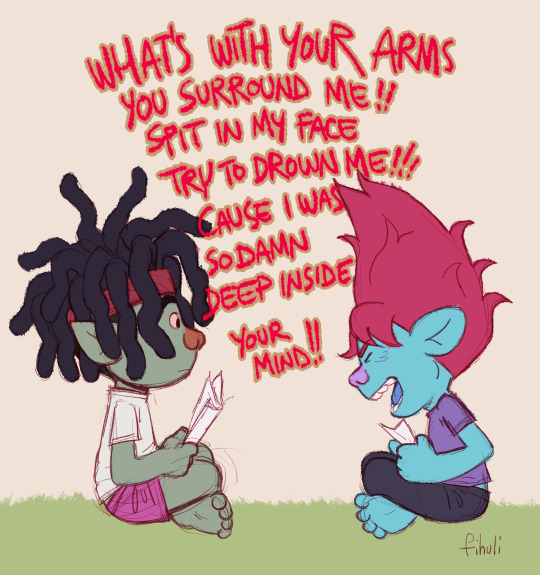
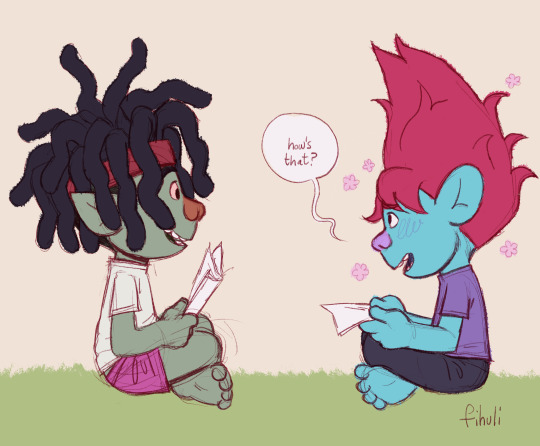
This answer is very long uhh I don't seem to be able to form short responses, mi scusi 😅
Back at home the brothers' music and then also the first year on the road with Flea the band sounds like the albums Music and especially Grassroots by 311. (Grassroots is such a banger of an album, I listen to it all the time, really recommend.)
Hed's the main influence on the band's sound because he's the main vocalist, songwriter and overall the most invested in the band succeeding (Les's main concern is making ends meet, and Flea is just enjoying the ride lol). At the start Hed and Les have had basically no contact with Rock Trolls so even though they're both more metal/punk than regular rock, their "rock side" is softer at this point. Hed also grew up with hip hop because of his peers so there's a lot of rapping in his lyrics. And he also incorporates reggae into his style a lot because of his favorite uncle, Kymani (one of the guys who live with Ish) who is a Reggae Troll. Hed is pretty much a sponge when it comes to music, much like Floyd. The closest I can come to describing his genre is a fusion of Rap Metal and Reggae Rock which are both already fusion genres jskksdjsk
(The band 311 has two singers and oddly they both sound like Hed and Les to me. SA Martinez (the higher of the two voices) sounds 100%, exactly like how I've imagined Hed's voice in my head. For Les I have a different voice claim because Les's personal style of music is much different from the band, but Nick Hexum (the lead vocalist here) is still in the second place when it comes to voice alone. Imagine my enthusiastic surprise finding voices for both brothers in the same band 😄)
examples from the two albums:
youtube
youtube
youtube
...
While driving around and performing small gigs they come in contact with the alternative and nu metal scene and meet a lot of Rock Trolls (mostly various Metal Trolls) and other mixed trolls, and in the following couple of years their sound gradually becomes heavier (Hed rediscovers screamo lol) and they go from rock to metal.
A year into their "touring" is also around the time Hed meets and starts dating Liv and gets her to join the band. Liv's genre has the heaviest sound of all of them (Industrial/EBM), which influences Hed and the band too. And with Liv on the drums, Hed takes over DJ-ing and is also able to put more focus on the vocals, which also makes Les step down and only sing backing vocals with the rest of the band if needed.
The band in this era sounds like the album Revolution by Insolence and to some degree Introduction to Mayhem by Primer 55.
examples from the albums:
youtube
youtube
youtube
...
Two years into the bands existence is when Floyd runs into them. At first he's more just standing there, observing their practices and performances warily, because he's had bad experiences with Rock Trolls in his one year alone and metal music still kinda freaks him out at this point. But he soon starts joining in in melodic parts and then it progresses into him singing longer and longer segments because he has the strongest vocals of everyone. And once he saves enough of his earnings for a guitar he starts playing the rhythm guitar too. (The guitar he took with him when he left the Troll Tree got stolen before he met the band.)
I guess I should clarify: Flea is the lead guitarist, Les is the bassist, and Liv and Hed switch on the drums and DJ-ing depending on the track. At one point they also get a keyboard.
It's also not that long before Hed and Floyd start actively writing songs together, sharing each others notes, and they start to split the singing parts more evenly. Hed even teaches Floyd screamo techniques, because he thinks Floyd has a great voice for them (He is correct, Floyd has a mean scream 😁).
During this time the band still pretty much sounds like Revolution by Insolence but with more melodic singing parts from Floyd (and screaming/shouting lmao). I think Verge of Umbra is another good band to compare, it sounds more clean and Floydy but still Hedy. (Man, I should write scientific research papers skjdkjf)
youtube
↑↑↑ song with the lyrics from the drawing at the top
youtube
youtube
youtube
From here on out I'm a bit unsure how the band's sound develops, but I'm pretty sure Floyd would unintentionally infect them with a mild case of radio friendliness (Pop trolls can't help their in your face nature lmao 😞). So for now I'm stopping here...
This took me days of searching and writing so I would appreciate to hear any thoughts you have if you've come this far and given some of the songs a listen. :)
#i spent way too much time on this rip#but i'm happy i did all the research bc now i have an album to point to that sounds a lot like what i had in my mind for the band#trolls#dreamworks trolls#trolls floyd#trolls oc#ex bandmates#hed#les#liv#flea#answered#my art#long post#music#nu metal#alternative metal#insolence#insolence band#primer 55#verge of umbra#311#311 band
183 notes
·
View notes
Text
Sarah J. Maas Bonus Chapter Masterlist
Many people have posted images of the bonus chapters from Sarah J. Maas's books, and I thank you for giving us access to content we would have missed out on otherwise. However, no one person has posted all of them, so I figure that I can collate the links in one place.
There are minor spoilers below the cut in the chapter descriptions, so be wary of looking too far ahead, if you have not read all the books.
Throne of Glass
The Captain and the Prince - A conversation between Dorian and Chaol before the start of TOG
The Assassin and the Captain - When Celaena arrives back at the castle from her first mission as the King's Champion between TOG and COM, Chaol is waiting to greet her
The Assassin and the Princess - Before the start of COM, once Celaena has been the King's Champion for a month, she and Nehemia do a little shopping in Rifthold
Untitled - Mistward is visited by nobles—including one of Rowan's exes—during Celaena's time there in HOF
Untitled - A bonus chapter while Aelin and the rest of her court travel through Terrasen in EOS
Untitled - Chaol and Nesryn's sea journey before the start of TOD
A Court of Thorns and Roses
Wings and Embers - Cassian goes to visit the mortal world and ask Nesta to deliver a letter to the mortal queens in ACOMAF
Feyre's Perspective - In ACOSF, after Feyre and Rhys tells her sisters about their baby, they have a conversation
Azriel's Perspective - After the Winter Solstice celebration in ACOSF, Azriel is wandering the halls, unable to sleep
Crescent City
Ruhn's Perspective - Once Cormac comes to town in HOSAB, Flynn's younger sister decides to visit
Bryce's Perspective - Part 1 - Part 2 - Cormac invites Bryce to a luncheon at Flynn's parent's villa in HOSAB
Tharion's Perspective - Part 1 - Part 2 - Tharion reminisces about first meeting Hypaxia during HOSAB
*EDIT TO ADD: HOFAS has five bonus chapters, none of which have names and are just referred to by the characters they're about.
house.of.hurricane on insta has a reading guide for them, and has them all available in her highlights at the alternative link below ↓
u/ManicPlusSize on reddit has also posted a PDF of all five chapters if that is preferred.
Bryce and Danika - Takes place before the start of HOEAB
Bryce, Azriel and Nesta - Read after chap 16 of HOFAS
Ember and Randall - Read after chap 80 of HOFAS
Bryce and Hunt - Takes place after the series ends
Ruhn and Lidia - Takes place after the series ends
An alternative is here; the highlights contain all eight chapters
If I have missed any, please feel free to let me know, or link them in the comments/reblogs :D
#sarah j maas#acotar#tog#cc#a court of thorns and roses#throne of glass#crescent city#bonus chapters#sarah j maas bonus chapters#it was annoying me having to search every time i wanted to read one#so i just did a whole days worth of research so i don't have to again#i hope this helps#i found two chapters i've never read before#so thats a plus#reference#world of sarah j maas#UPDATED
3K notes
·
View notes
Text

just an old hick goin' fishin
plus kim "i am winning at fishing. something which is both normal to want and possible to acheive" kitsuragi
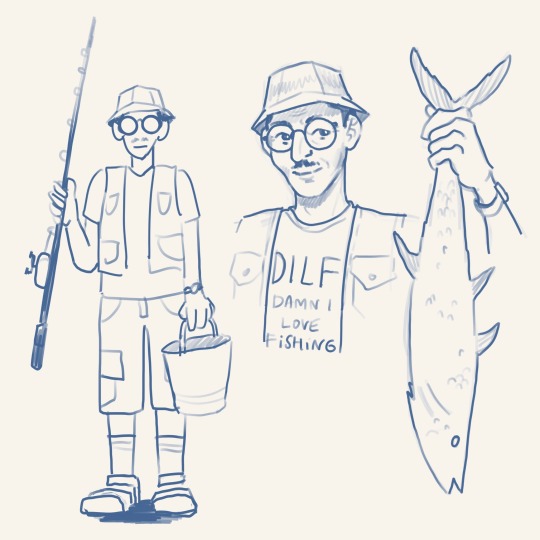
ref
#I FOUND THE LINK TO THE ART I REF'D FINALLY#HARRY. FRECKLES. TRUTHER.#also i have seen too much art of them looking cool and good#i am balancing it out by making them boring middle aged men who go fishing#harry got them both the tshirts for their weekend fishing trip#and kim spent a lot of time researching fishing techniques because he has a visceral need to be competent at everything he does#harry: the point of this weekend is to get outdoors and have fun!!! kim: if i dont catch a big fish im going to drown myself in this lake#also kim: did you have to wear your sluttiest little manwhore shorts it is distracting#harry: i can take them off if you'd rather ;)#disco elysium#harry du bois#kim kitsuragi#my art
2K notes
·
View notes
Text
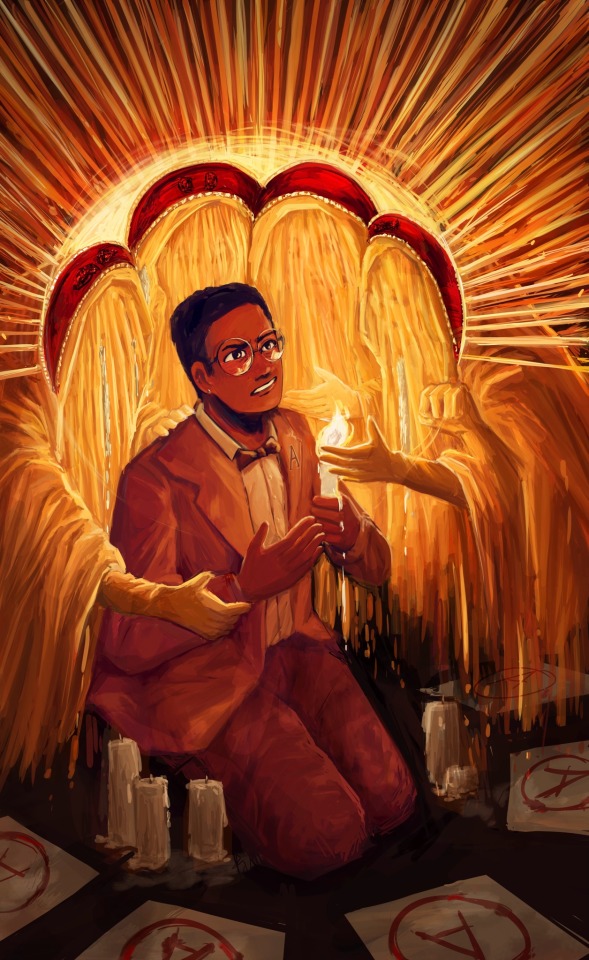
litany of the martyrs (click for better resolution!)
#at some point i wanted to make an illustration for each character but in retrospect maybe each is multiple song-coded..#drew the sketch for a quincy thing after a chat with a mutual reminded me this song existed dfsghjkl and then spent weeks rendering this#quincy cynthius martin#adamandi#i'm finally done with this! the saints especially were joys to paint and the halo a menace.... this has been the most ambitious one so far.#but it also took quite long because i only worked on it <engages with quincy> when mentally okay to deal with the themes. i'm not religious#but i do identify with the irrational(?ish) guilt + family legacy + academic achievement + disregard for self. also more complex thoughts#about love [but depsite quincent being a large part of quincy's character this piece deals with mostly the Rest of it. so another time..]#anyways! in the original sketch- the saints had heads bent towards quincy so the halo spikes pointed at him. but this worked better! halos#of the saints implying/creating one for quincy was a concept from the start though. in the show they don't touch him directly here but#differences in mediums i think- i don't have time in an image to craft a narrative so everything has to be happening. also artistic liberty#misc inspiration for this includes stained glass windows. i might have maybe misinterpreted the saint costume but i think i logic-ed it out#as the cloth part following a nun's habit w the hood. and then halo above. the material is also more transparent originally but i had. um.#too much fun painting fabric folds.. if you look closely you can see the basis of faces though behind the cloth; but only the vague shapes#because smth obscurity + inhumanness// cassian is the only one i gave a mouth though. that stems from melliot's post about the saints and#st cassian as spokesperson (<- did research teehee!) that's also how i found out which costume = which saint. speaking of which.#left to right: 'st lucy take my hand' // 'st lawrence give me strength' (presses quincy forward; but hand on shoulder connotates guidance)#/'st cassian help me smile' (quincy's mouth is btwn a grimace and a smile; tilts up at side. also no direct touch bc added insidiousness.)#//'st jude [...] i hope your causes burn' (jude's hand is in two places to show movement- nearing the flame and then snatching back; burnt)#other notes: at the midst of the flame the core is shaped like a human heart /the saints and their wax are all melting like the candle for#fun visual effect and also this way they are even less tangible <real>. perks of painting as a medium i guess. // also insp from icarus?#wax and burning imagery; looking at the halo and rays as parallel to sun that burns. too close to the sun; melting; hurting; hurtling //#candles at bottom are a nod to the frankly gorgeous set// also the entire composition kind of stems from the lyric <what use is a candle if#both ends aren't burning>; the two sides between the concepts of catholic guilt and academic perfection that spur quincy#the halo above (saints and guilt; litanyofthemartyrs) and the 'halo' below (academic papers; insp from choreo for perfect at school)#the papers were originally supposed to be more glowy. but i like the idea of it now being a reflection of how quincy's priorities shift#also of note is that <candle> in centre = quincy; w burning candle + aforementioned heart in flame -> most human; idea of love + passion#last thoughts: kneeling + hands close tgt = prayer //wax dripping onto the red As make an effect that looks like blood. because i like#hiding that within the adamandi pieces :OO continuity!! // i've run out of tags but yeah! had fun with this one! every so often i go a#little insane in making art and the final result astounds even me. ngl i'm quite proud of this one. pretty colours <3333
306 notes
·
View notes